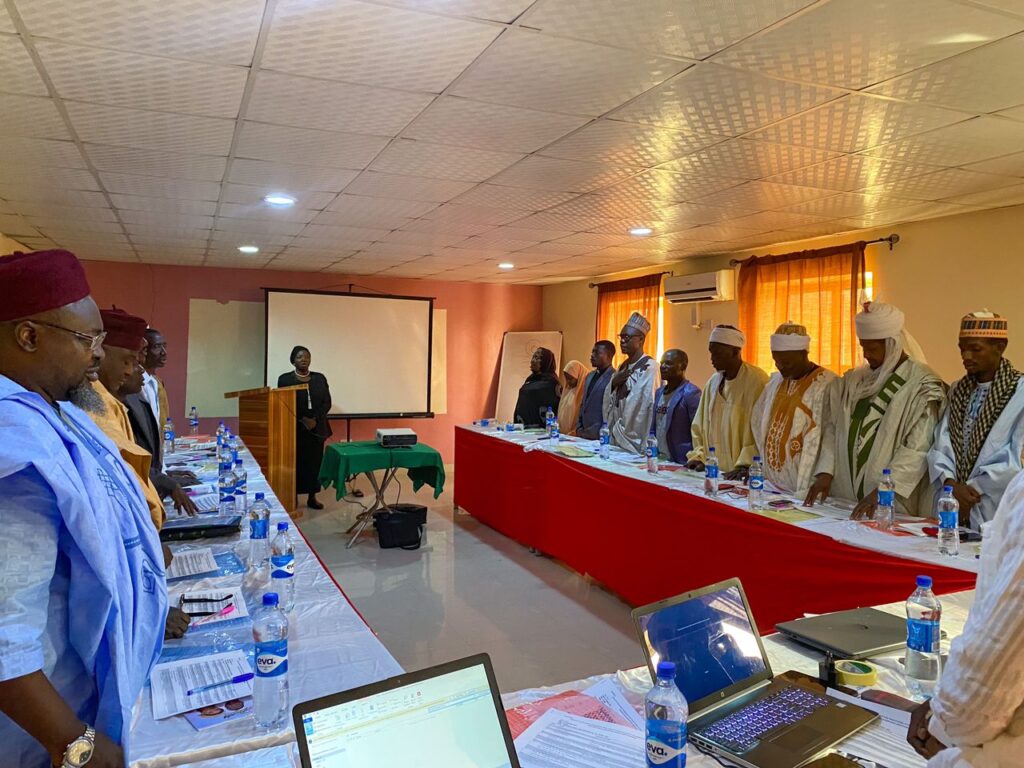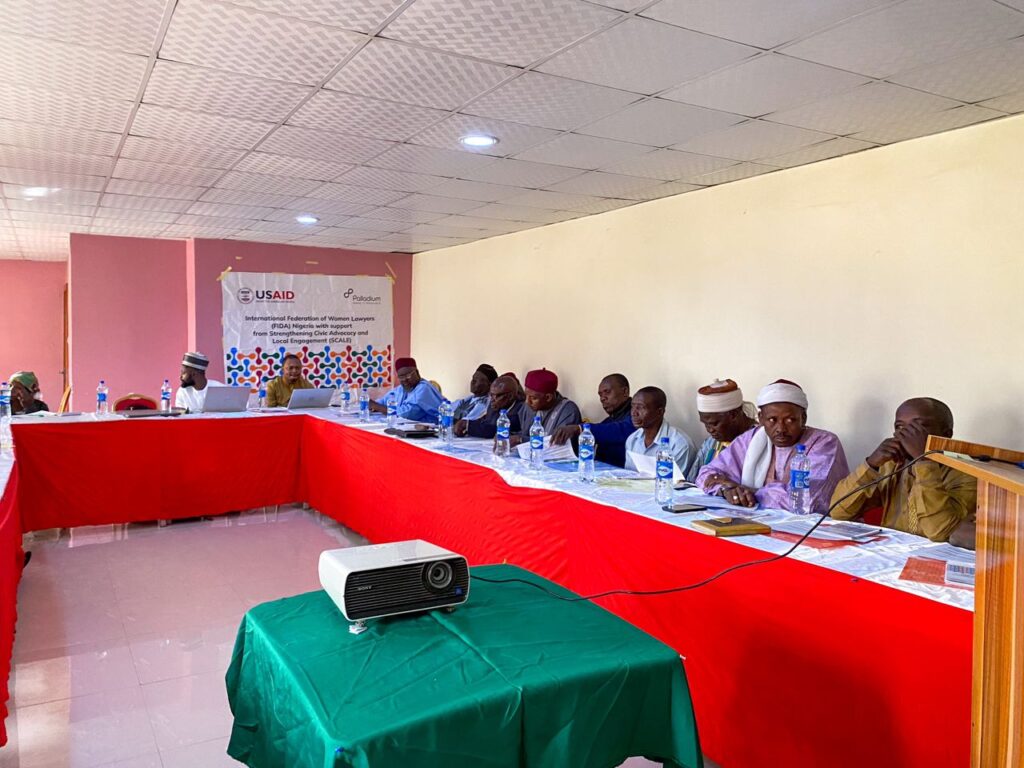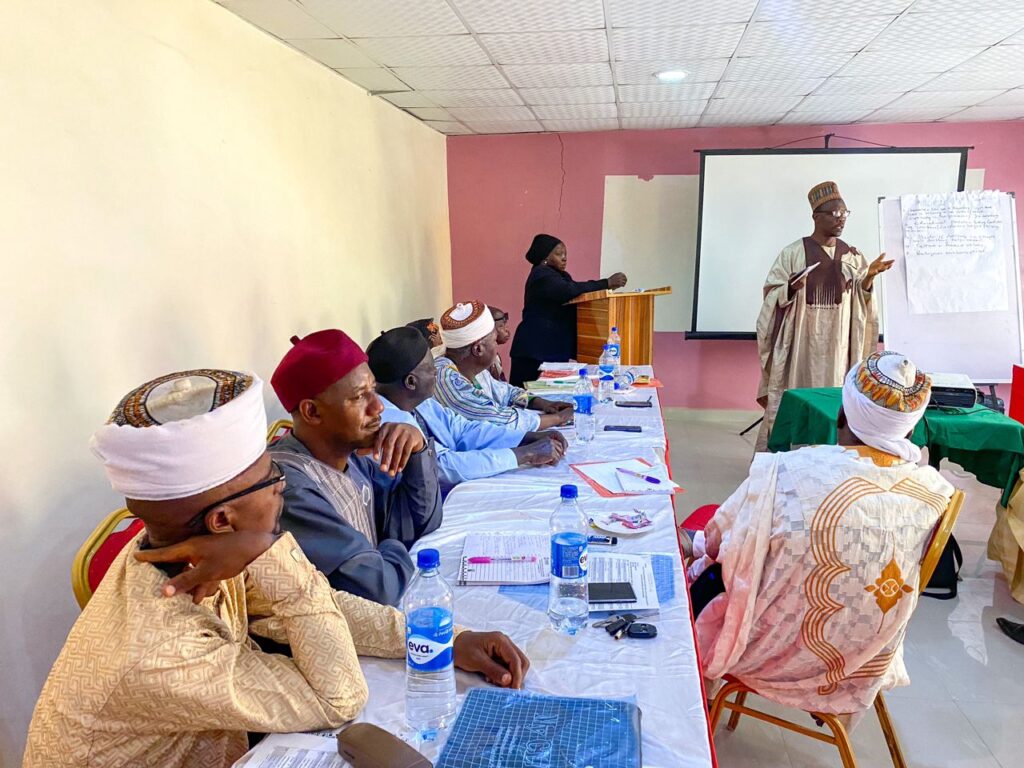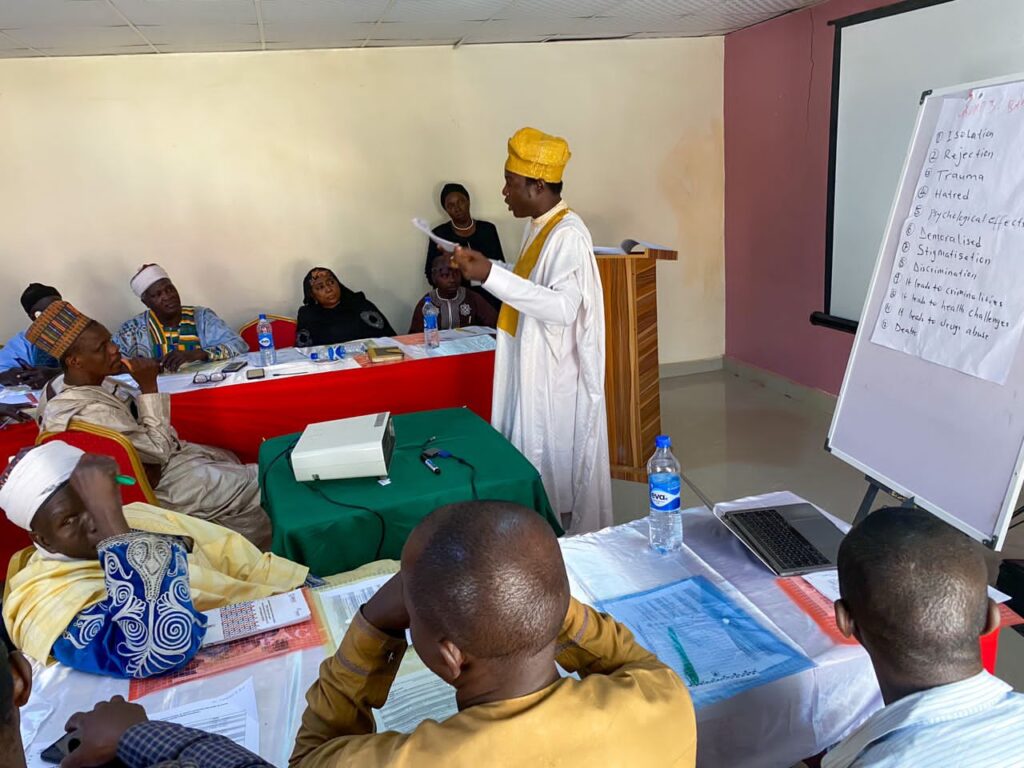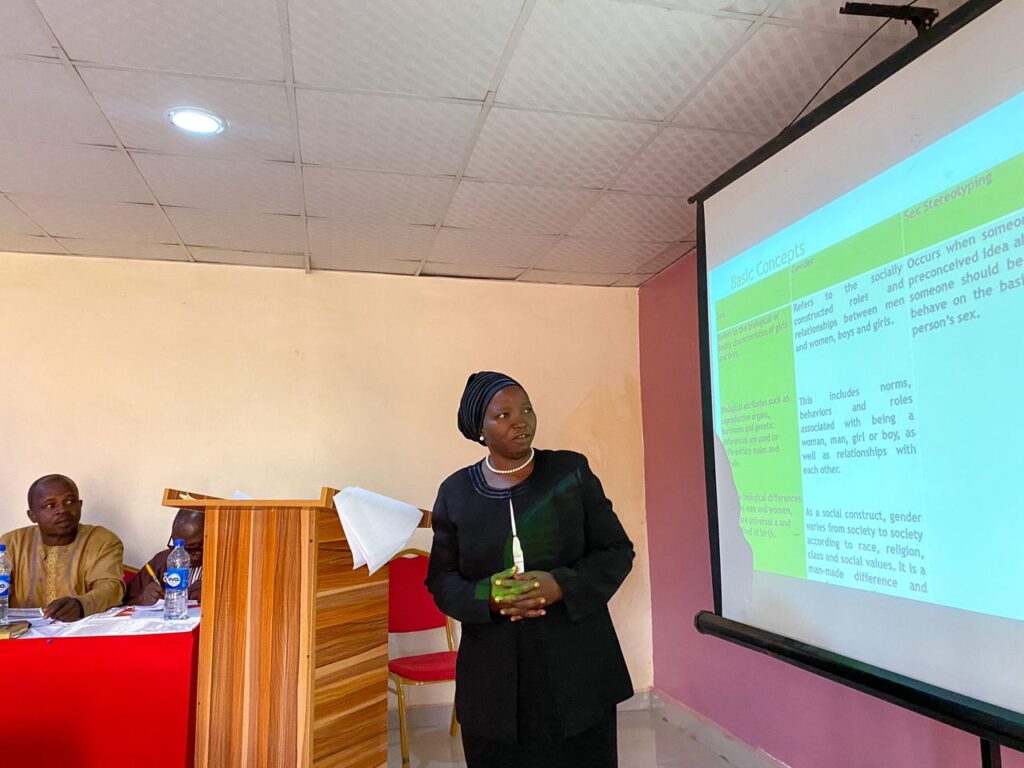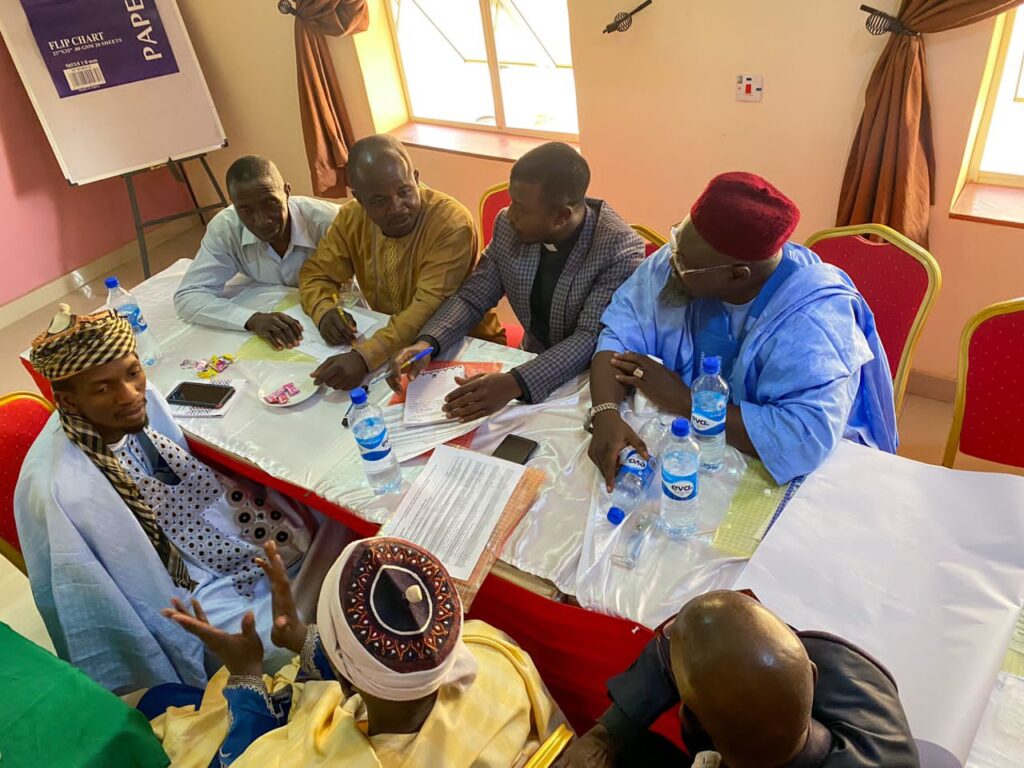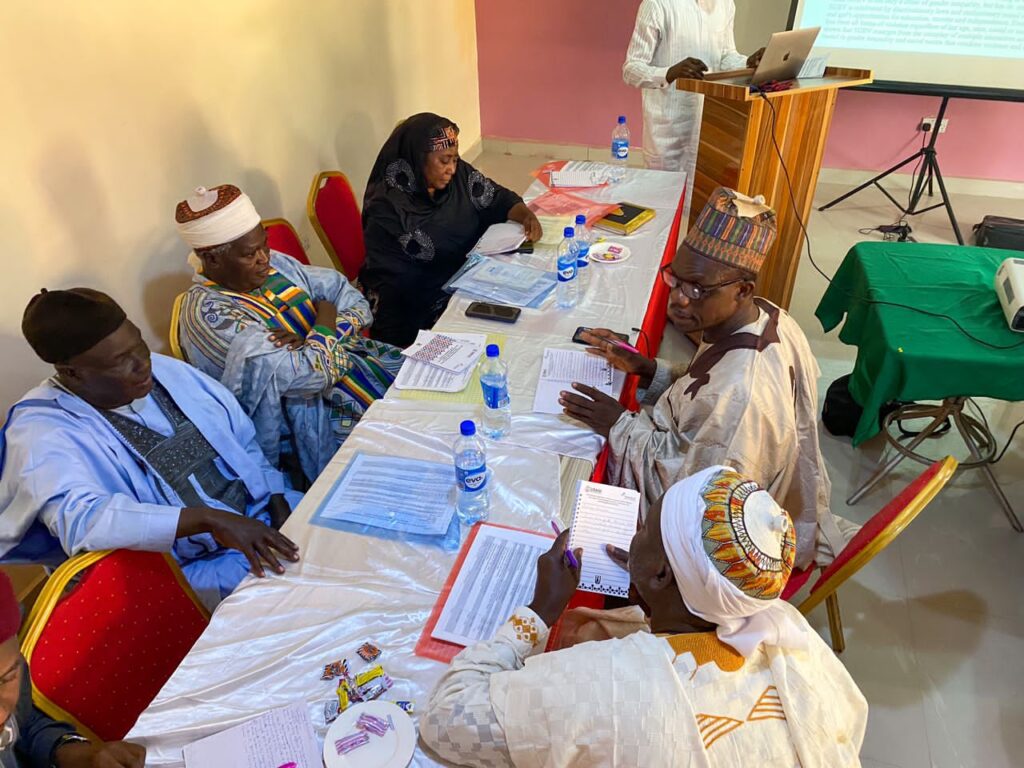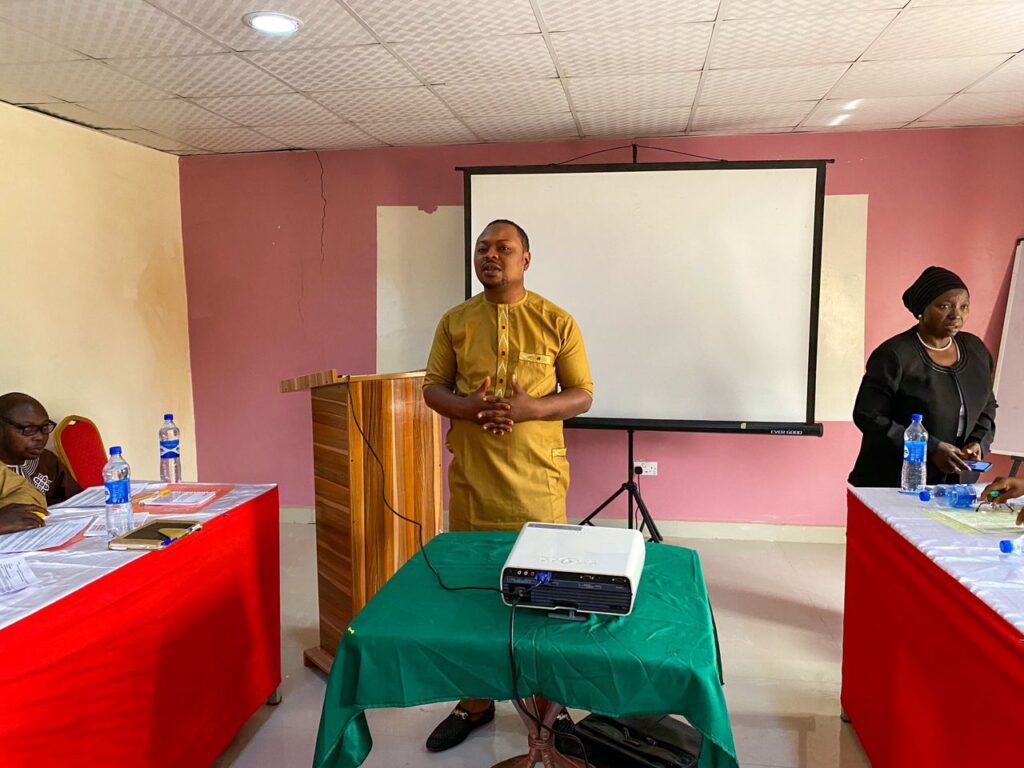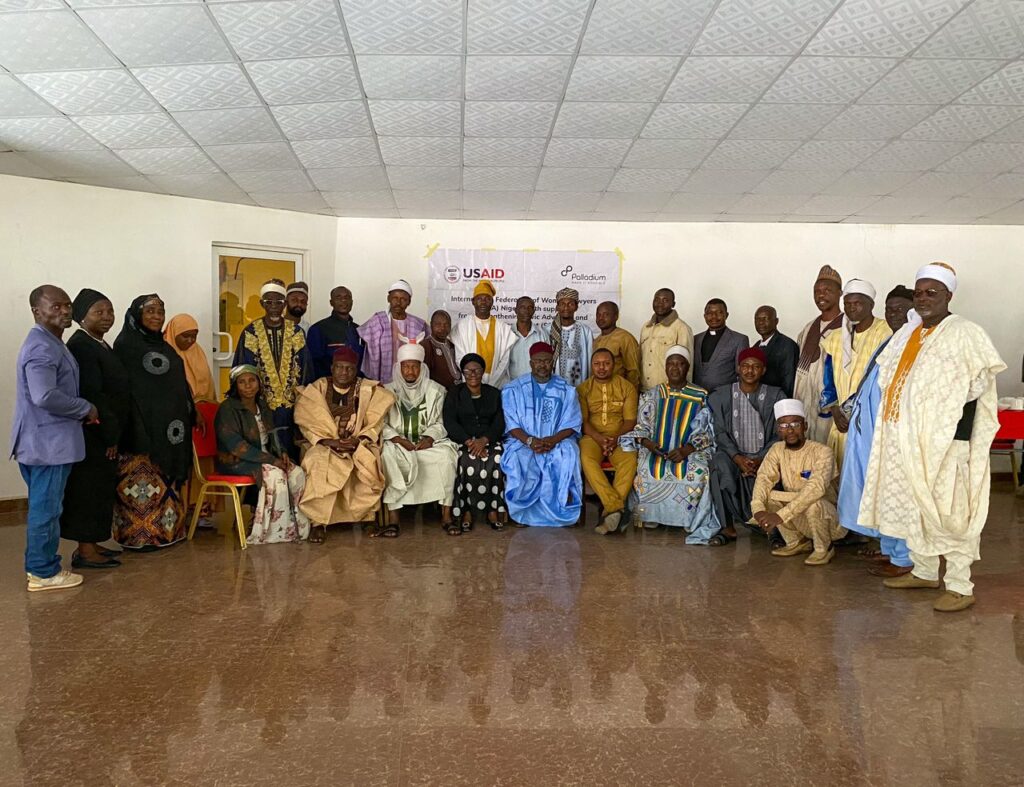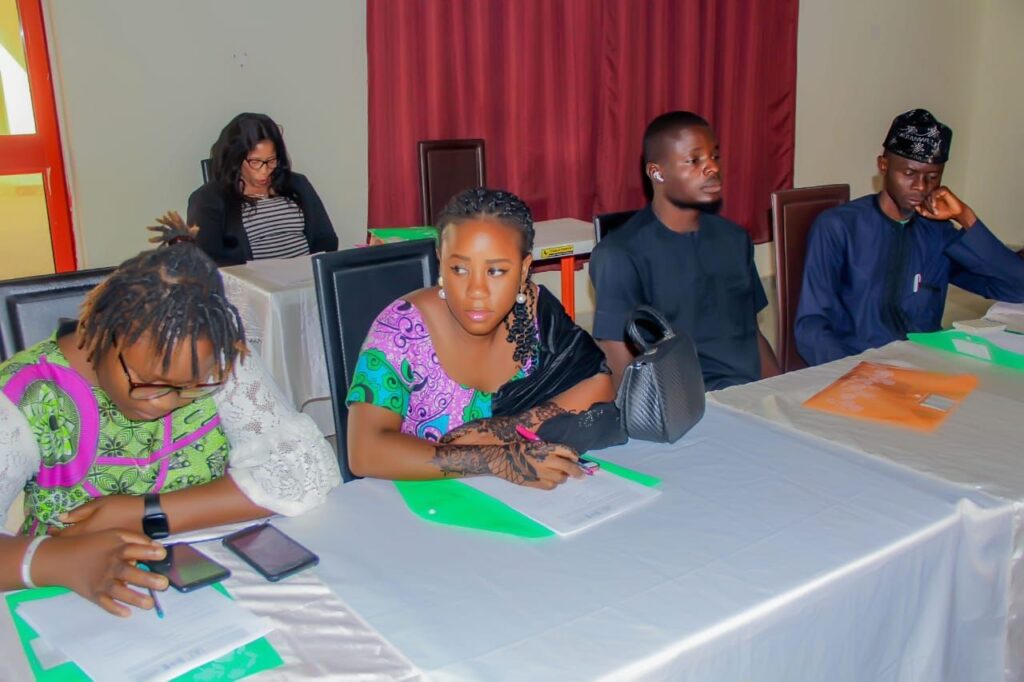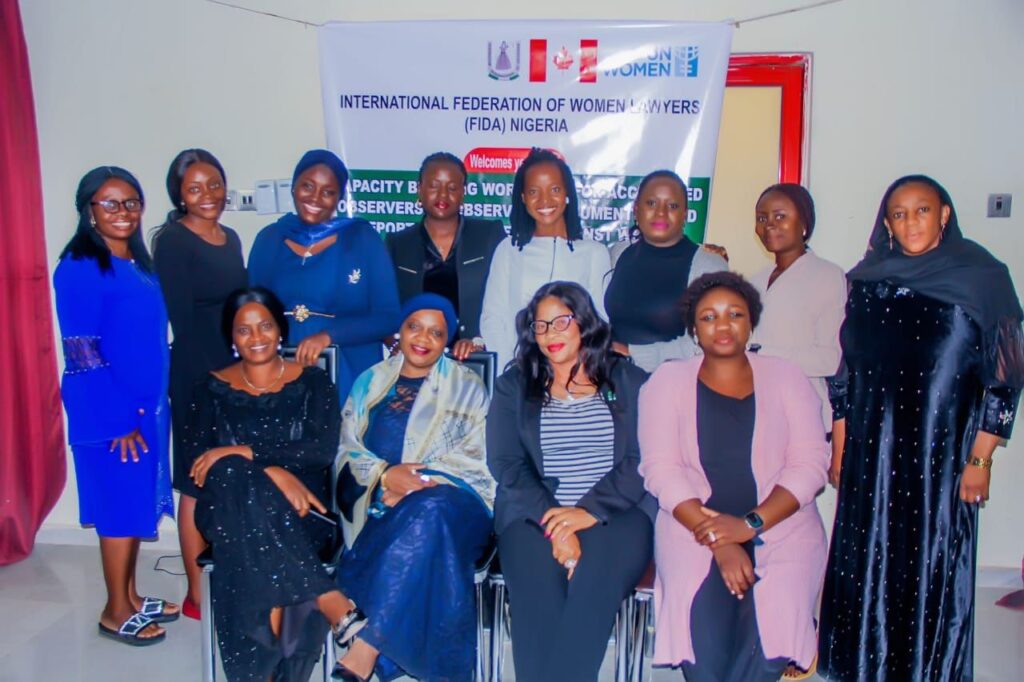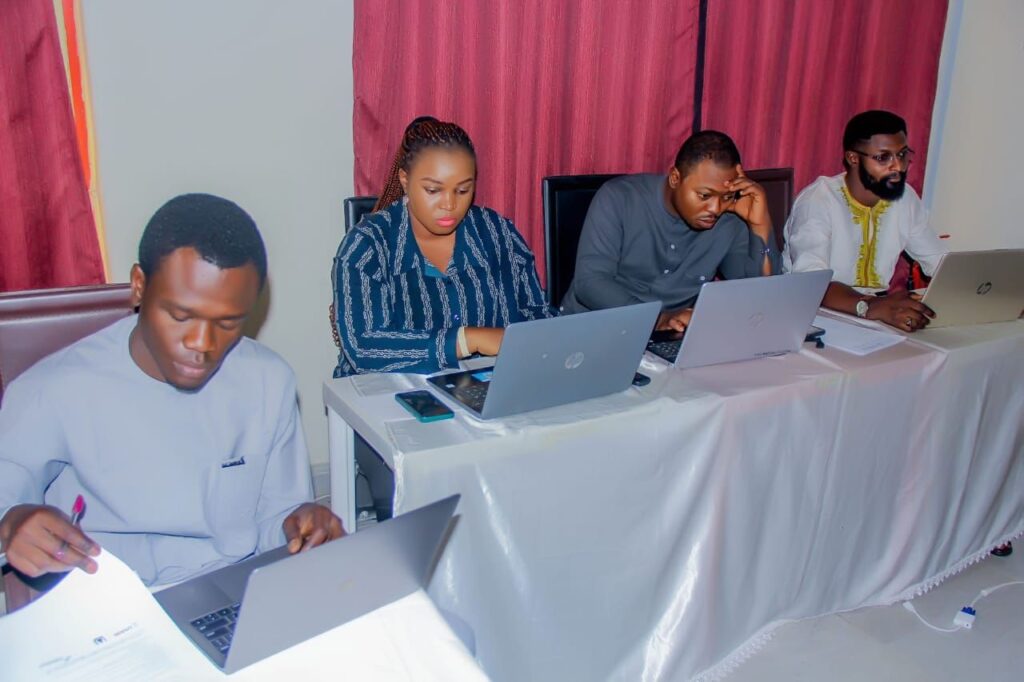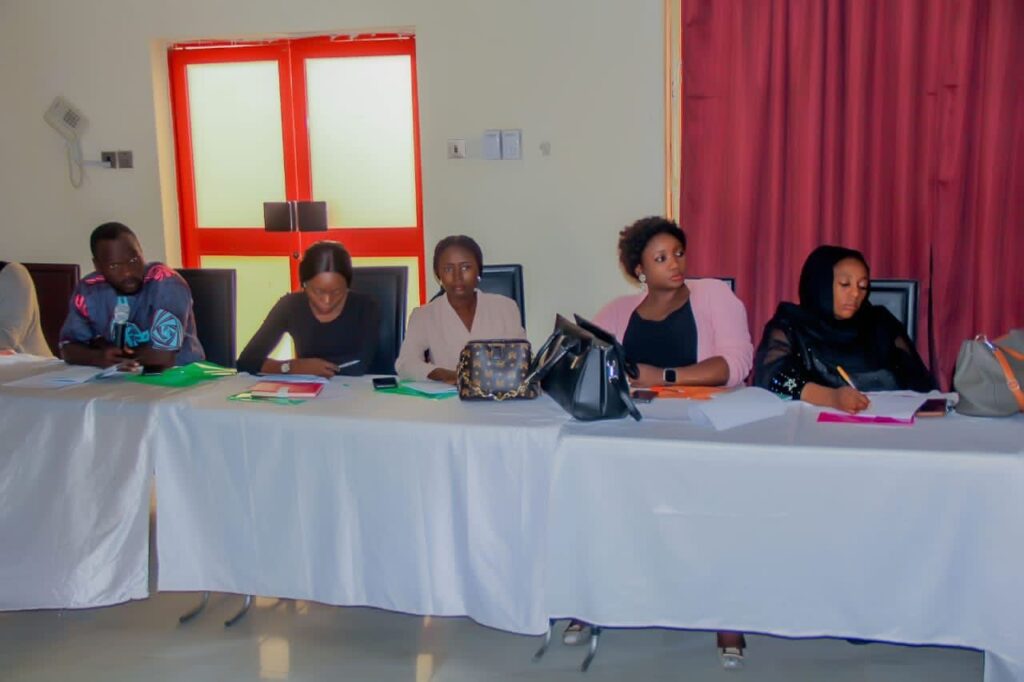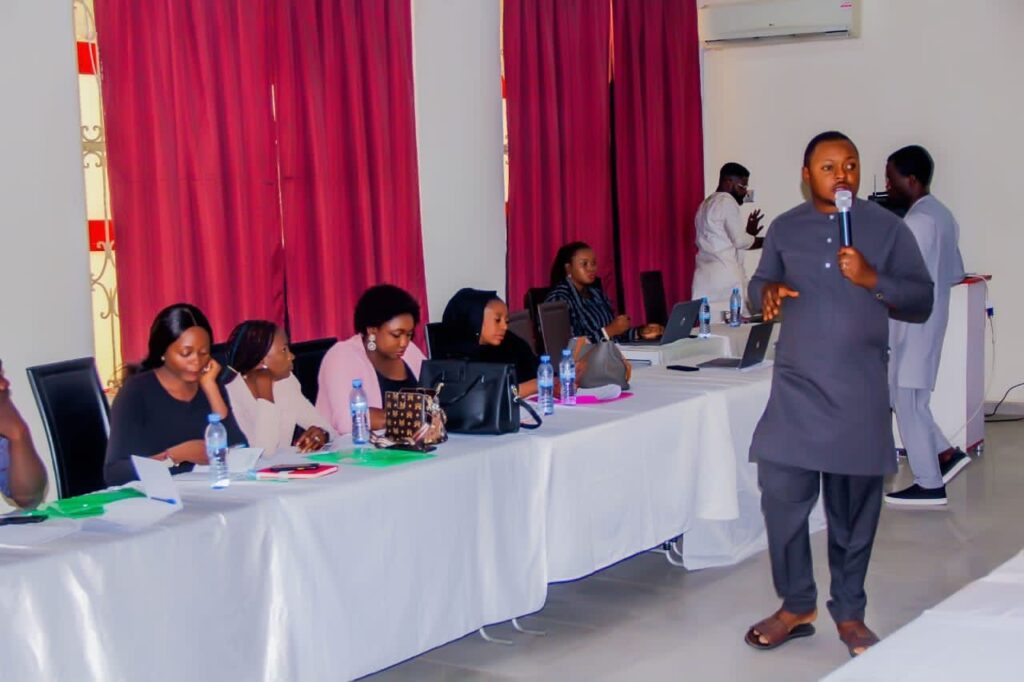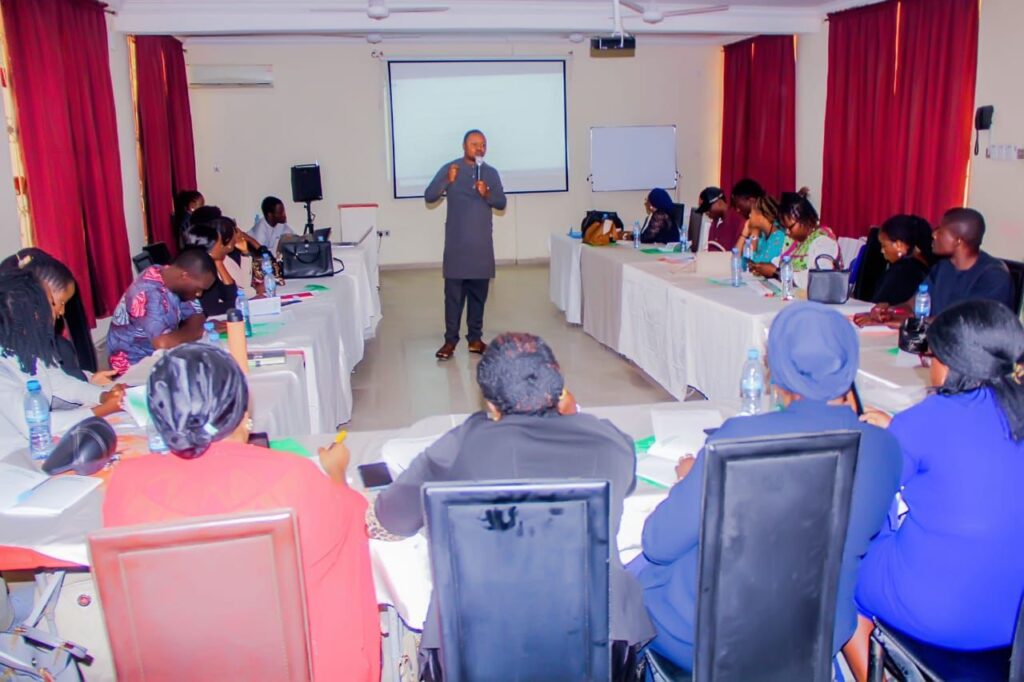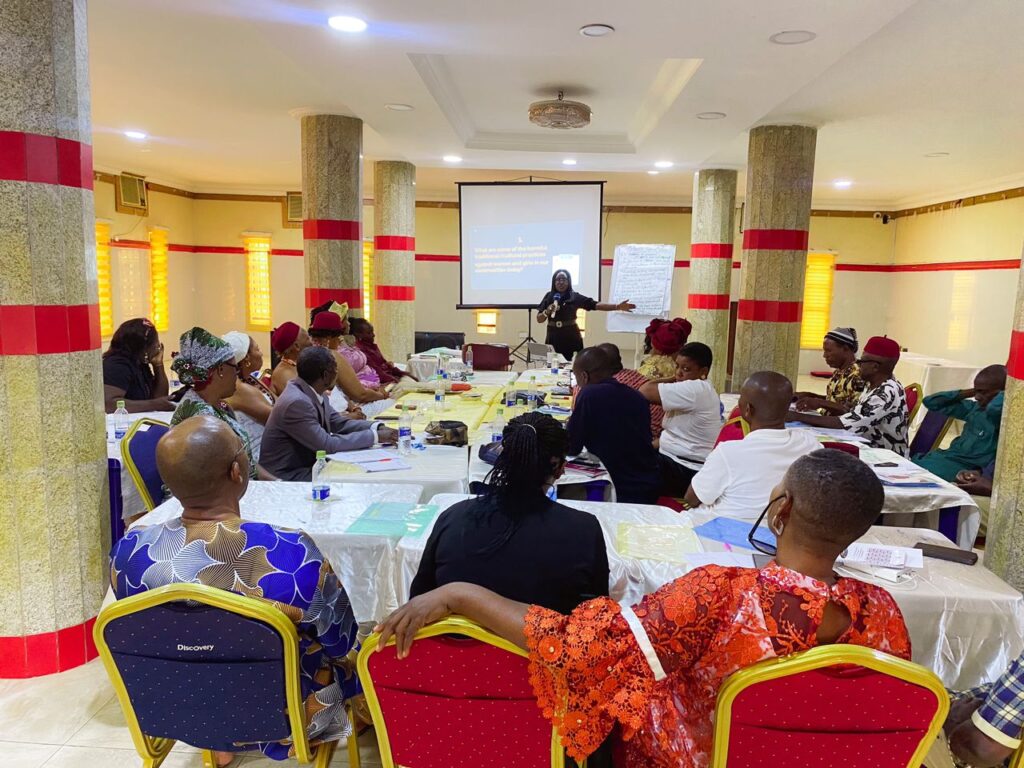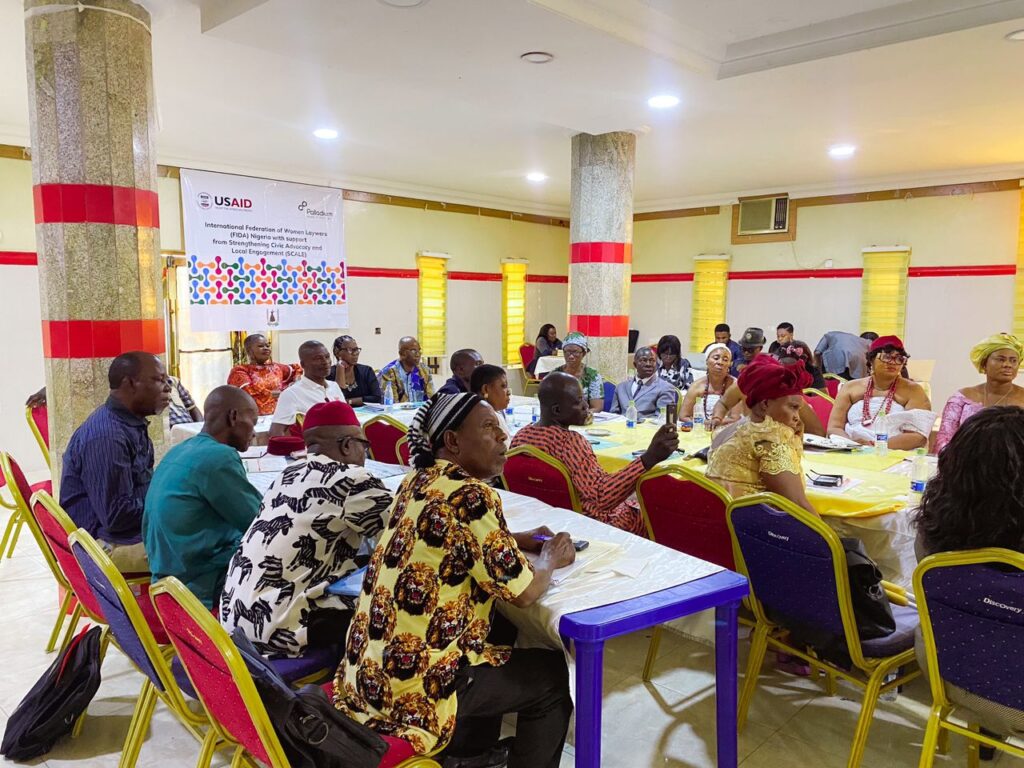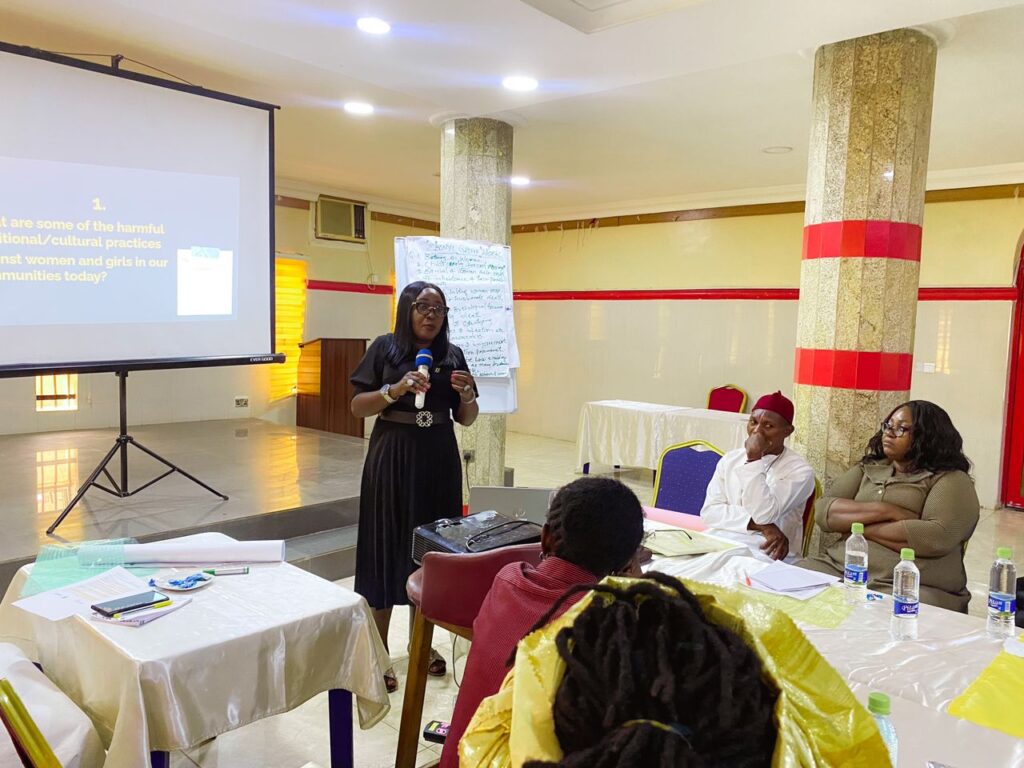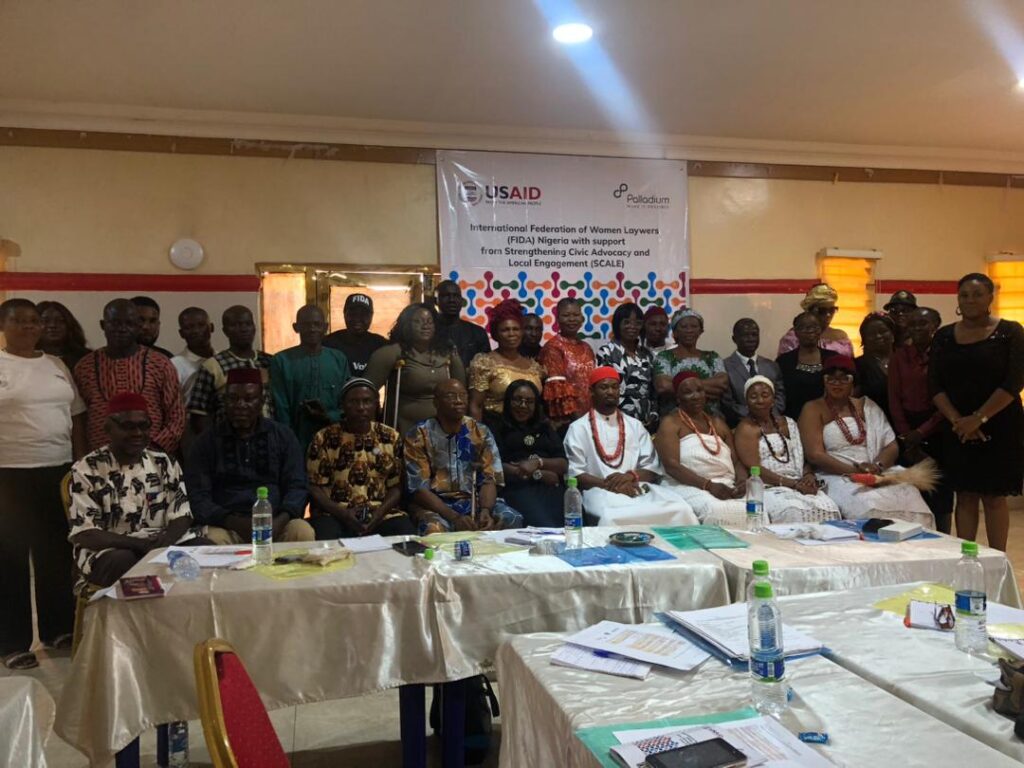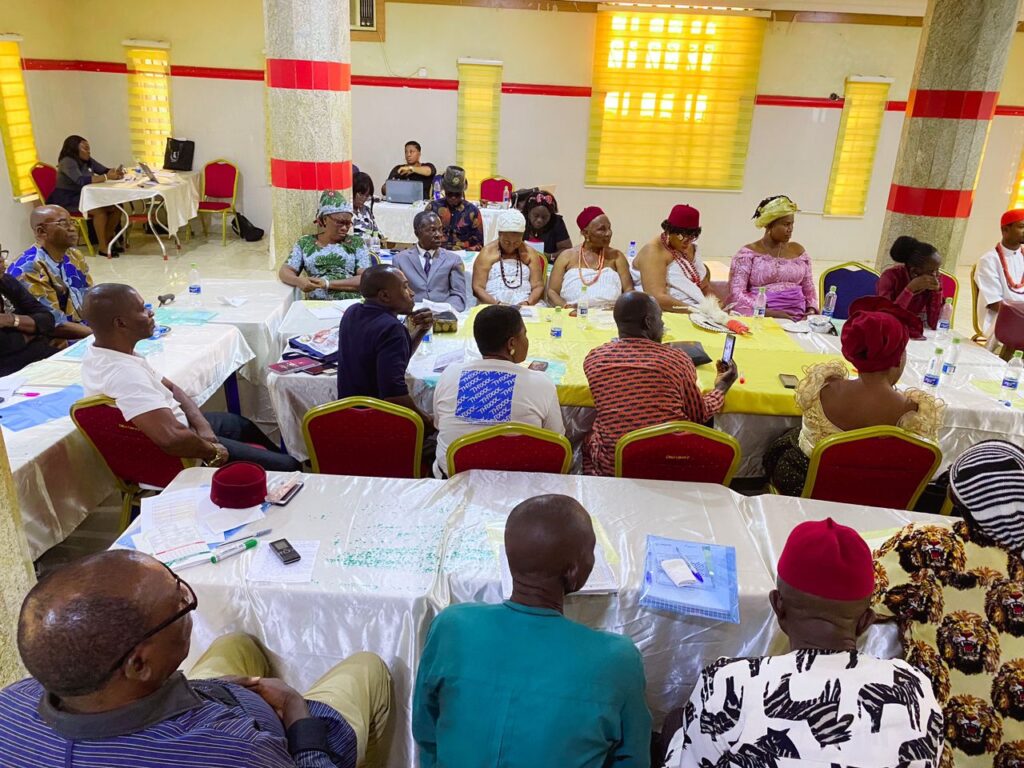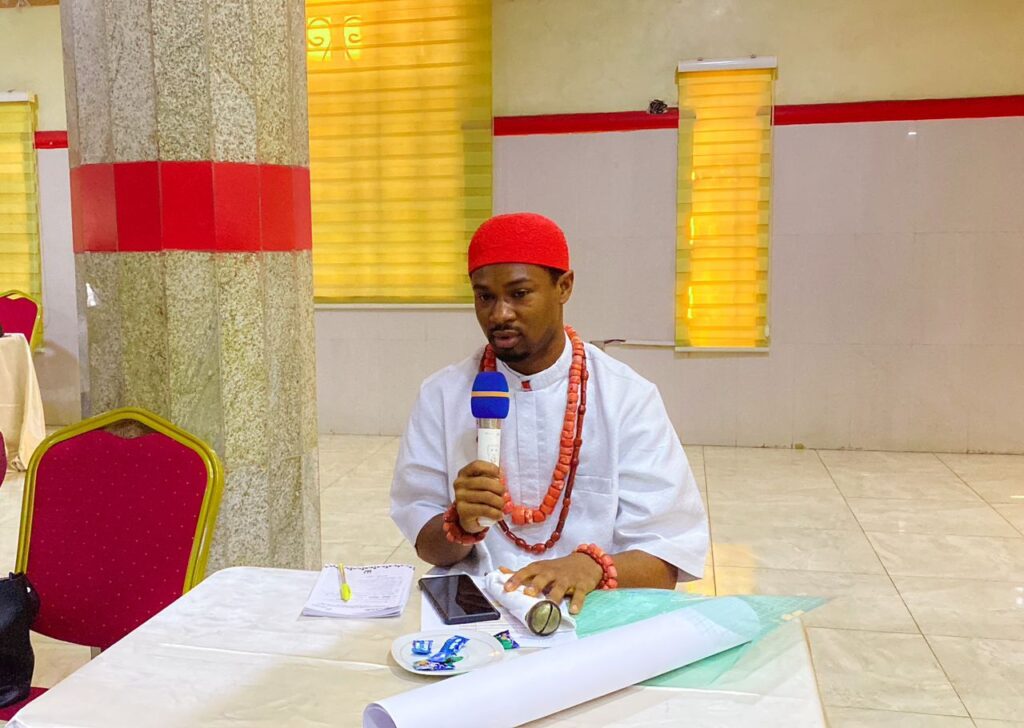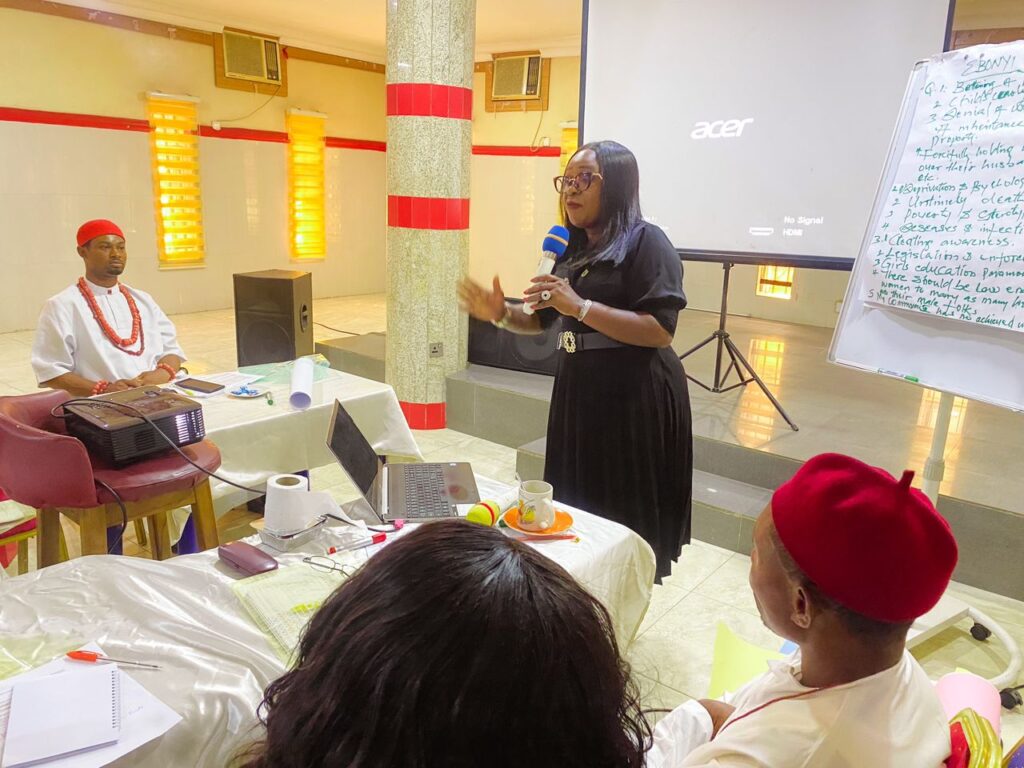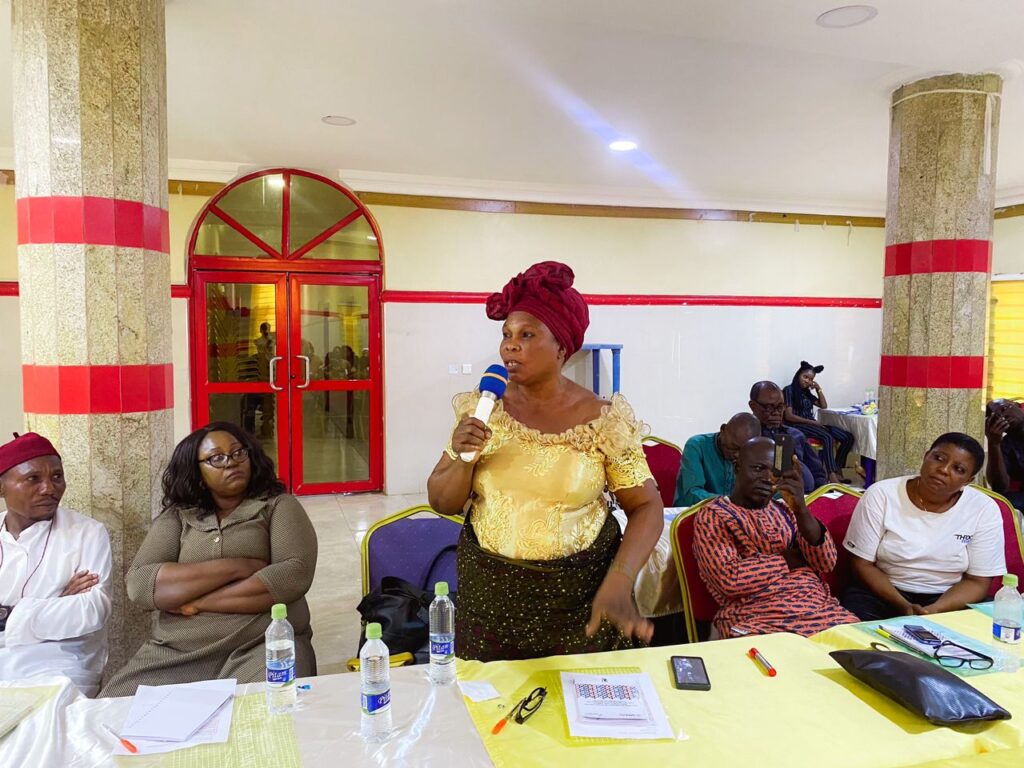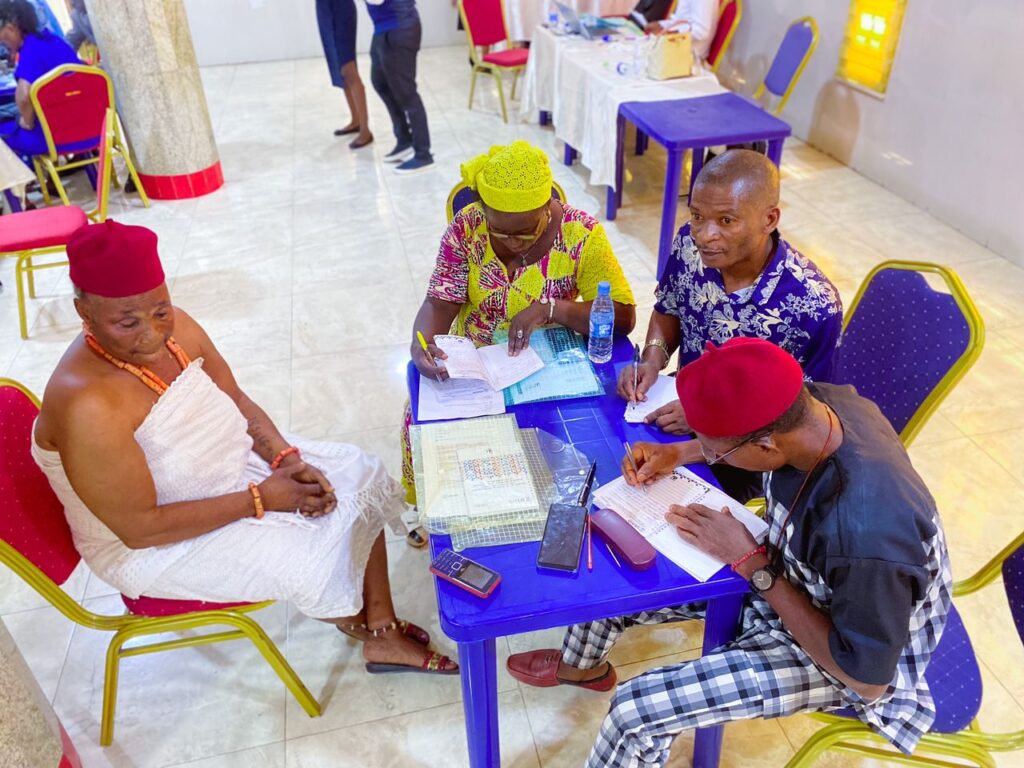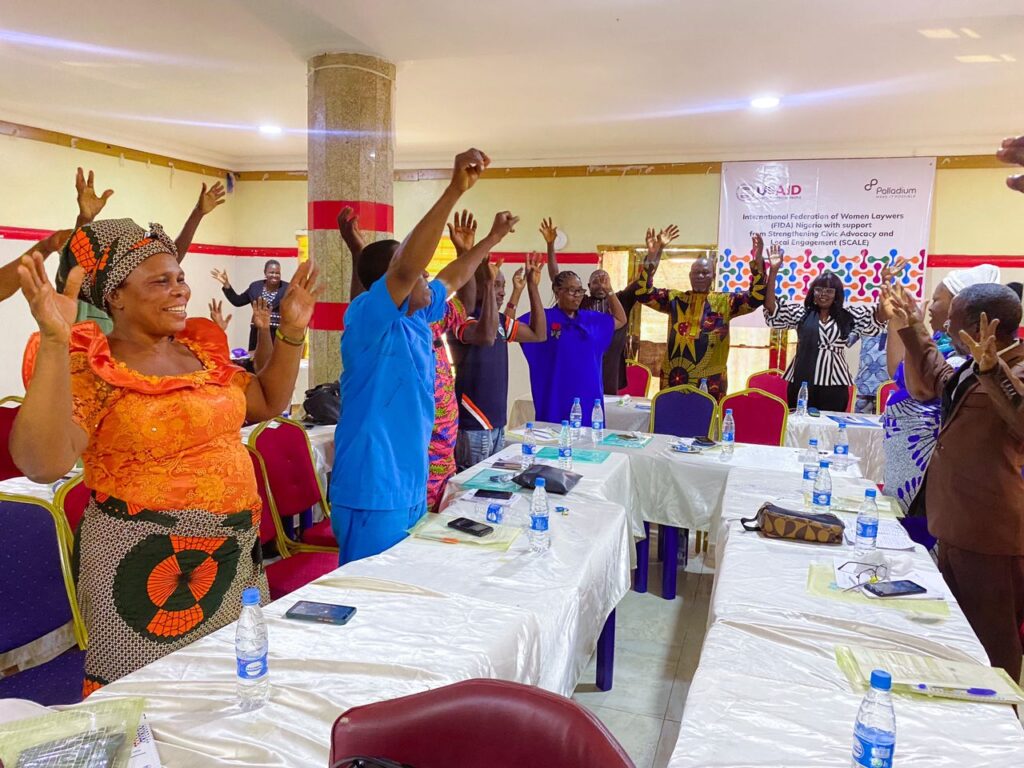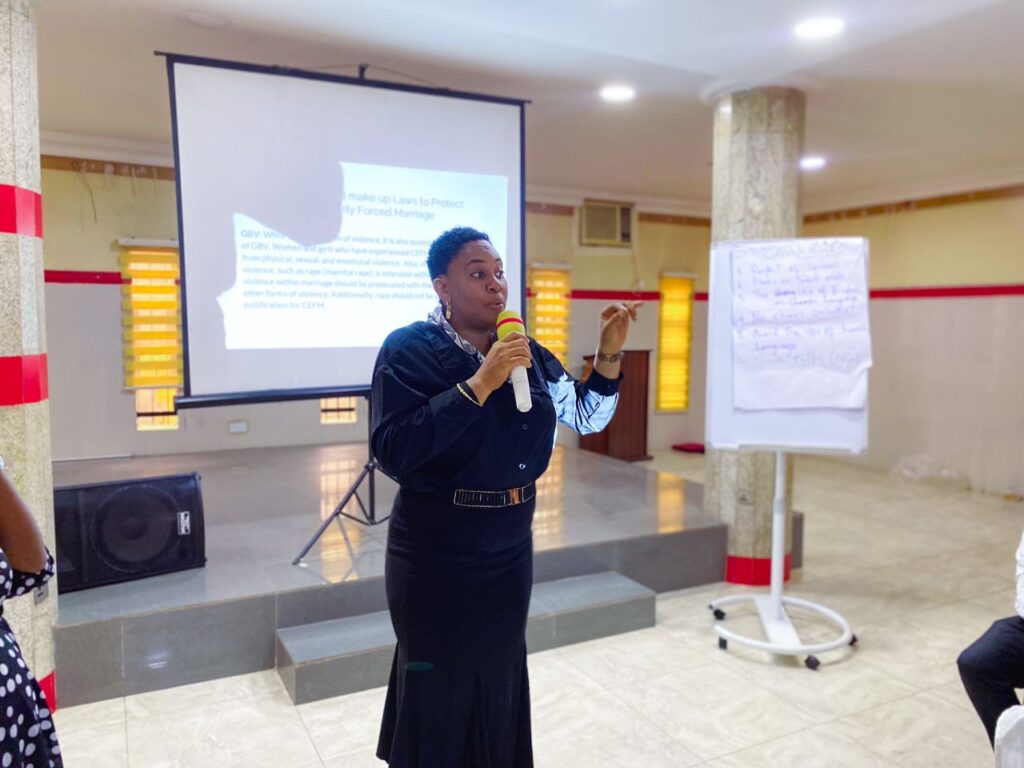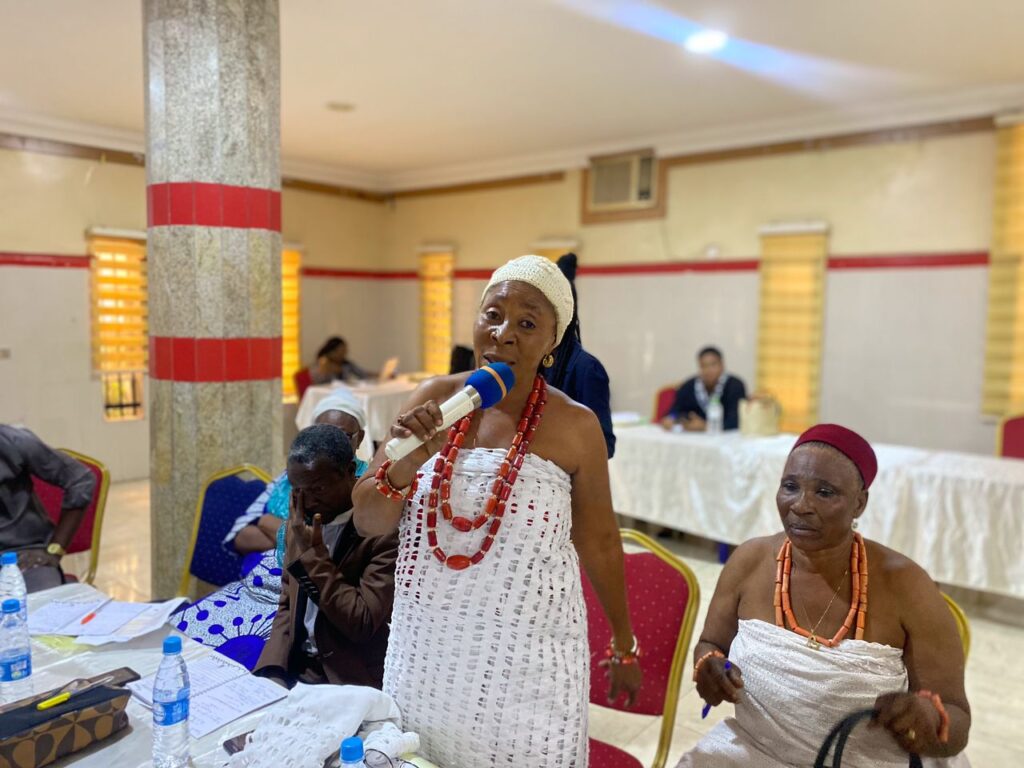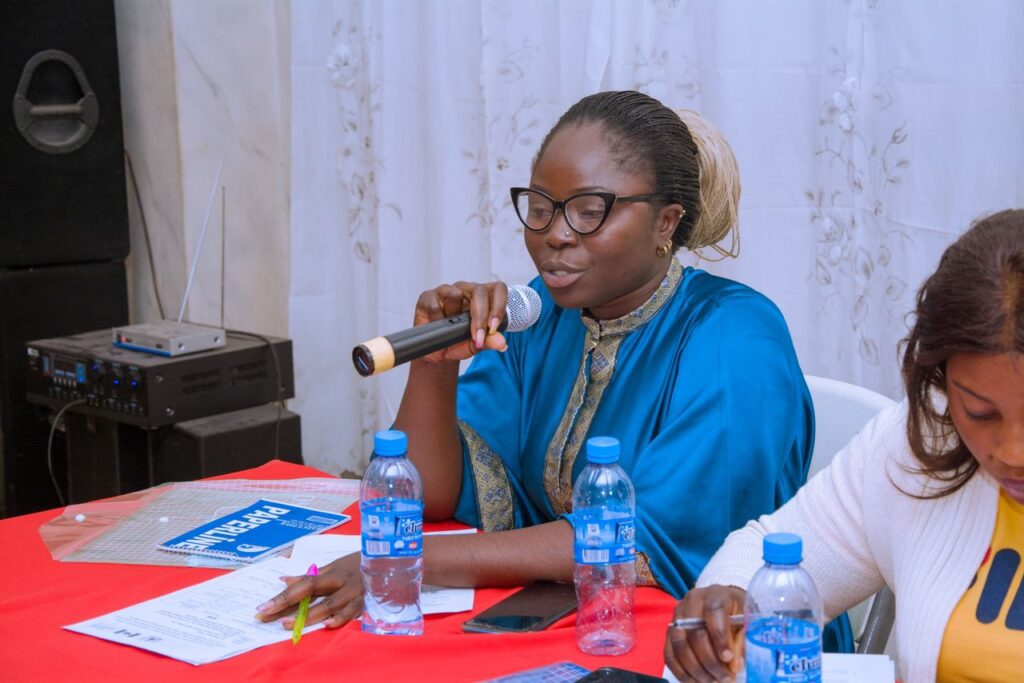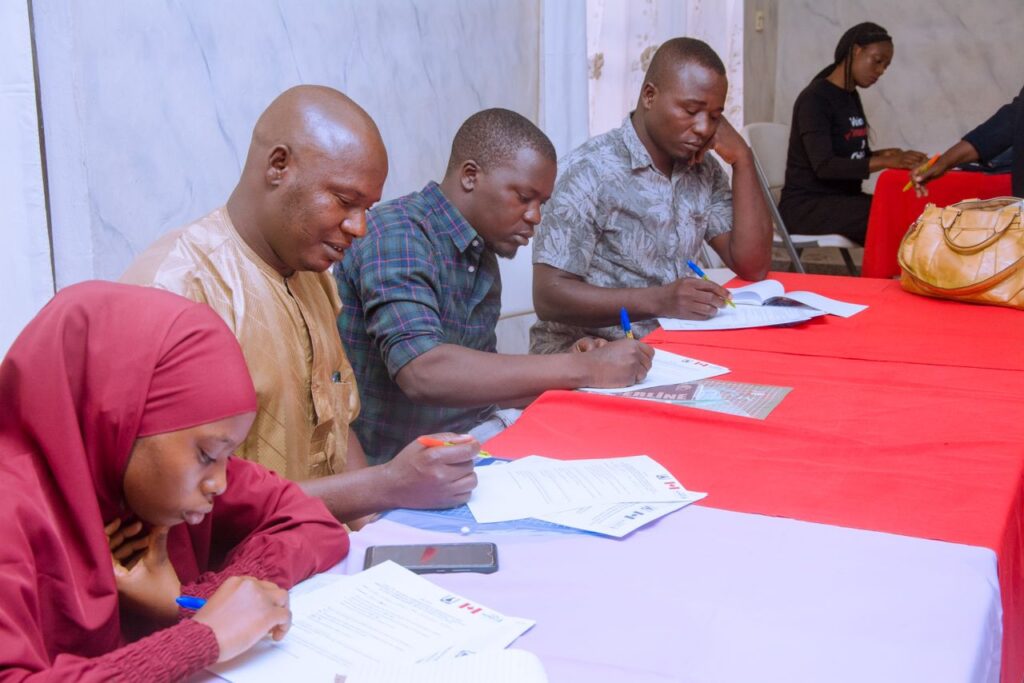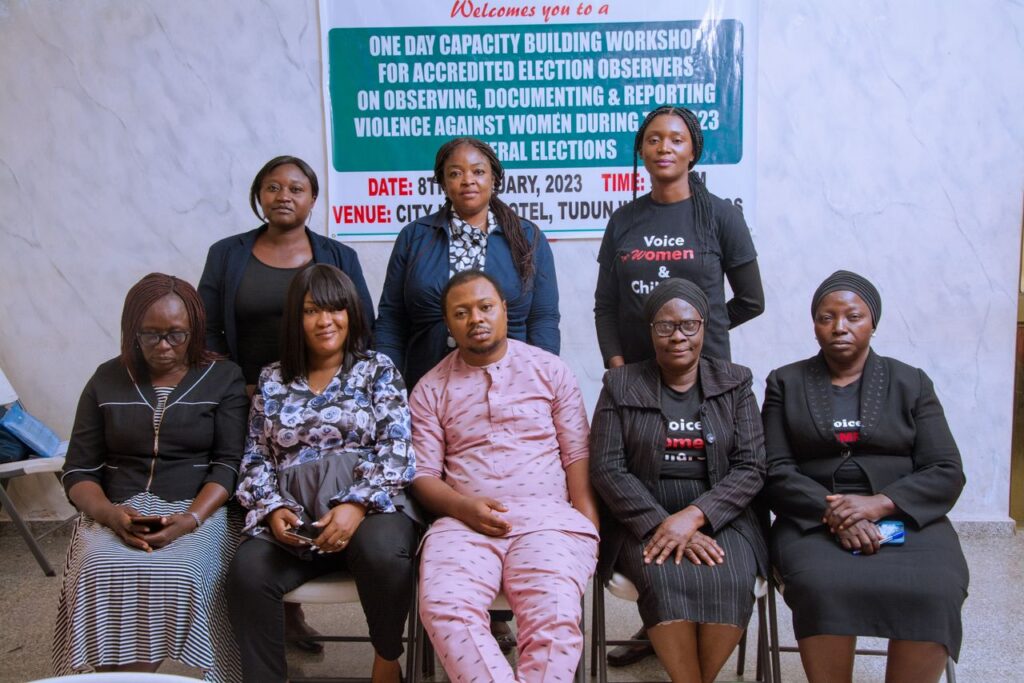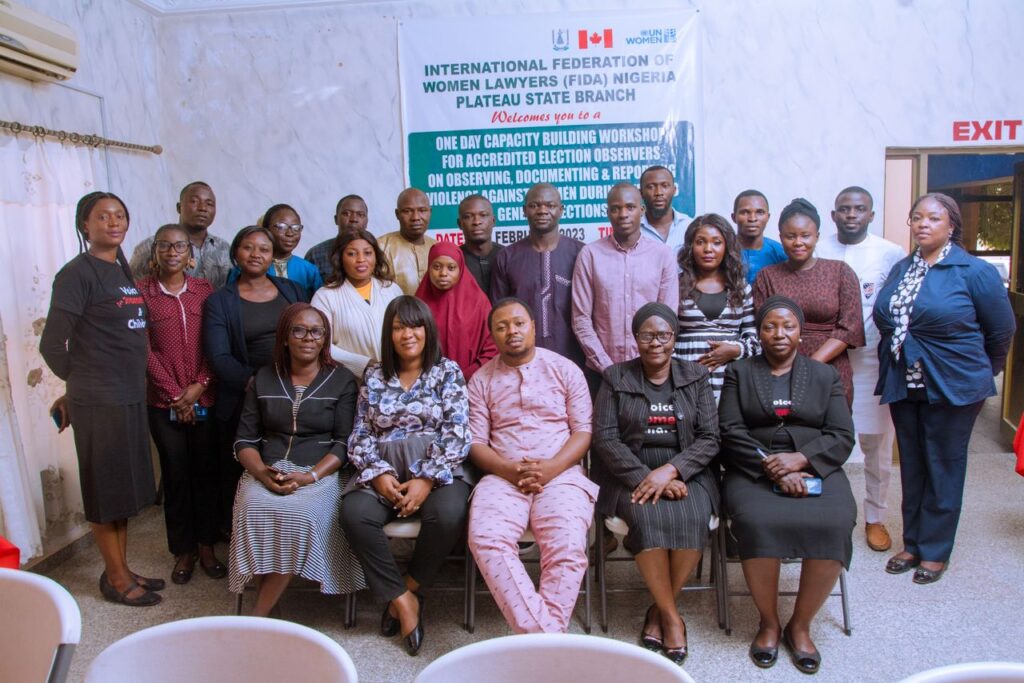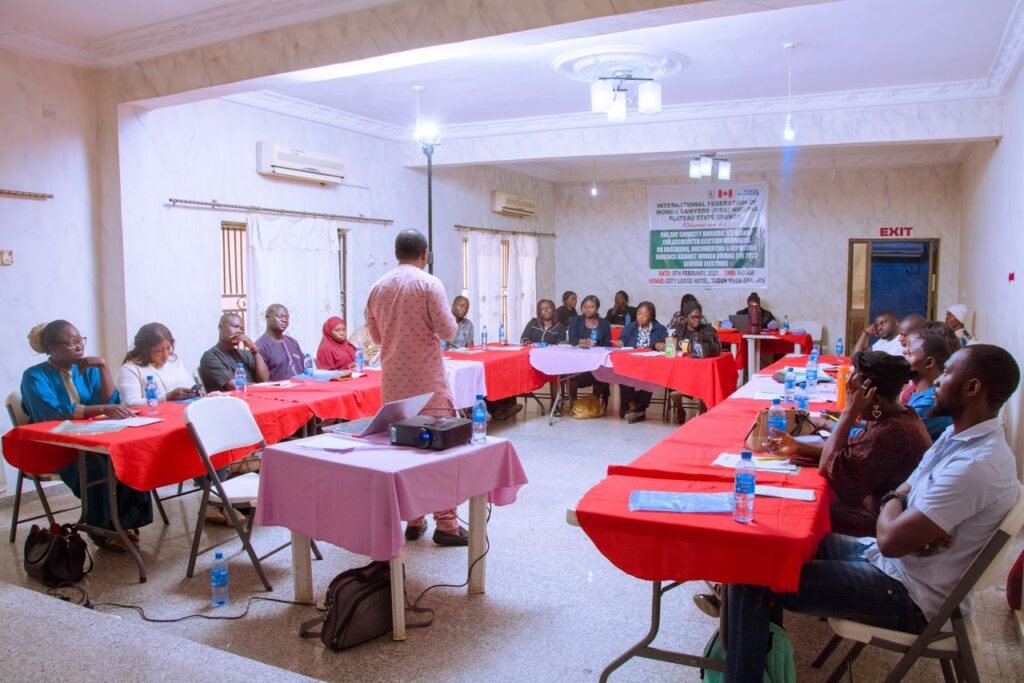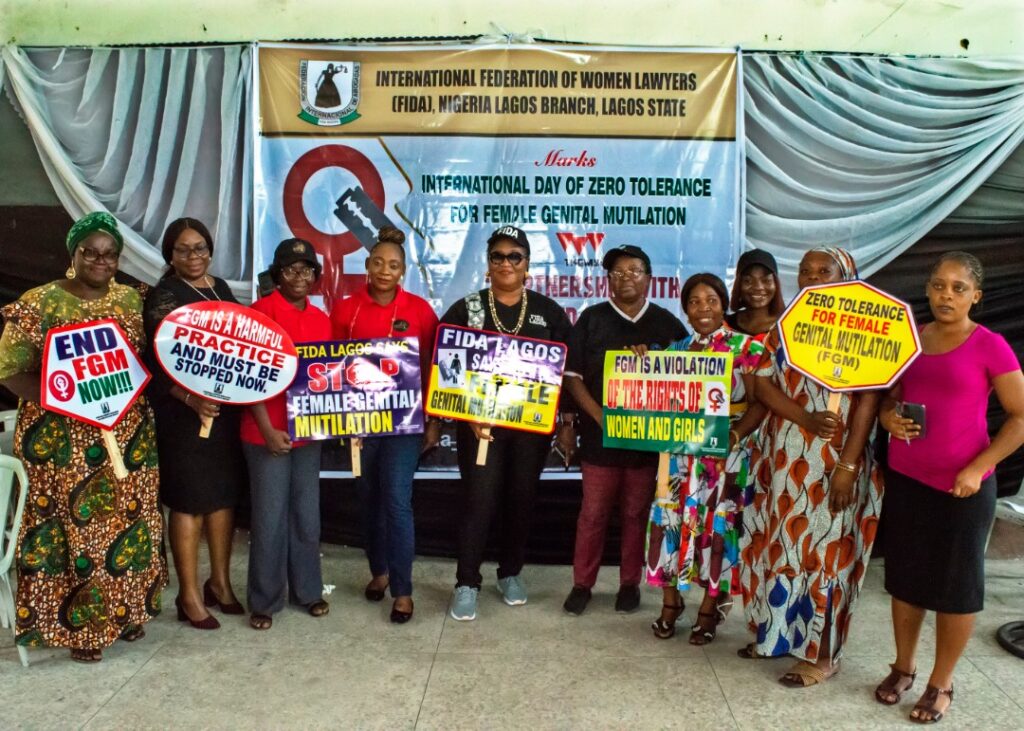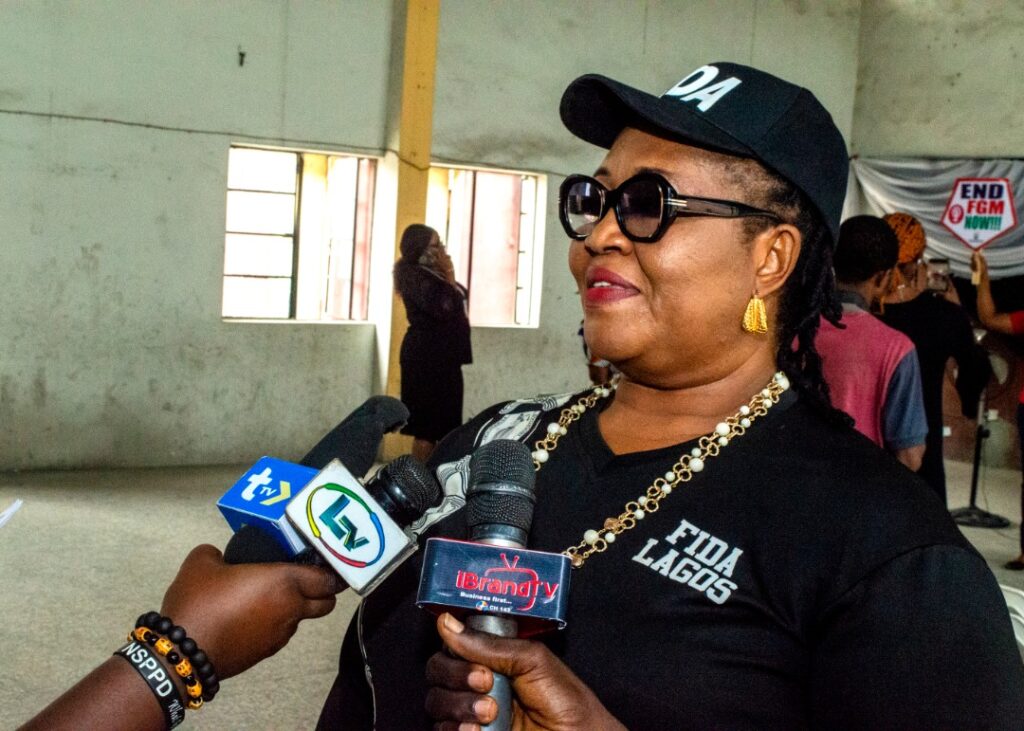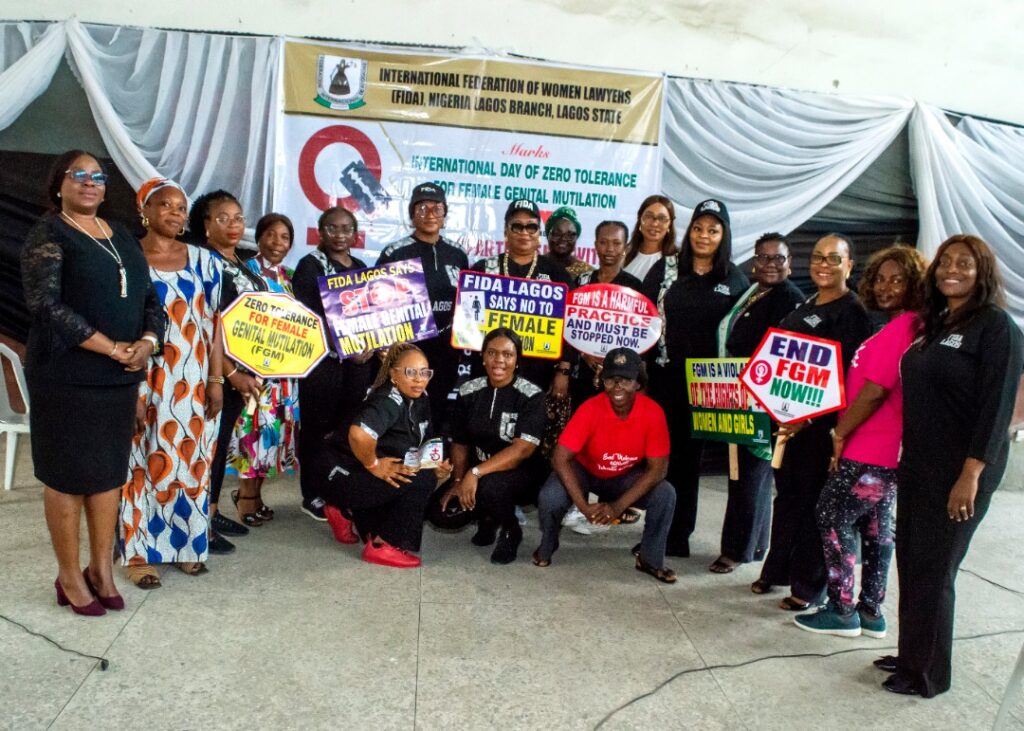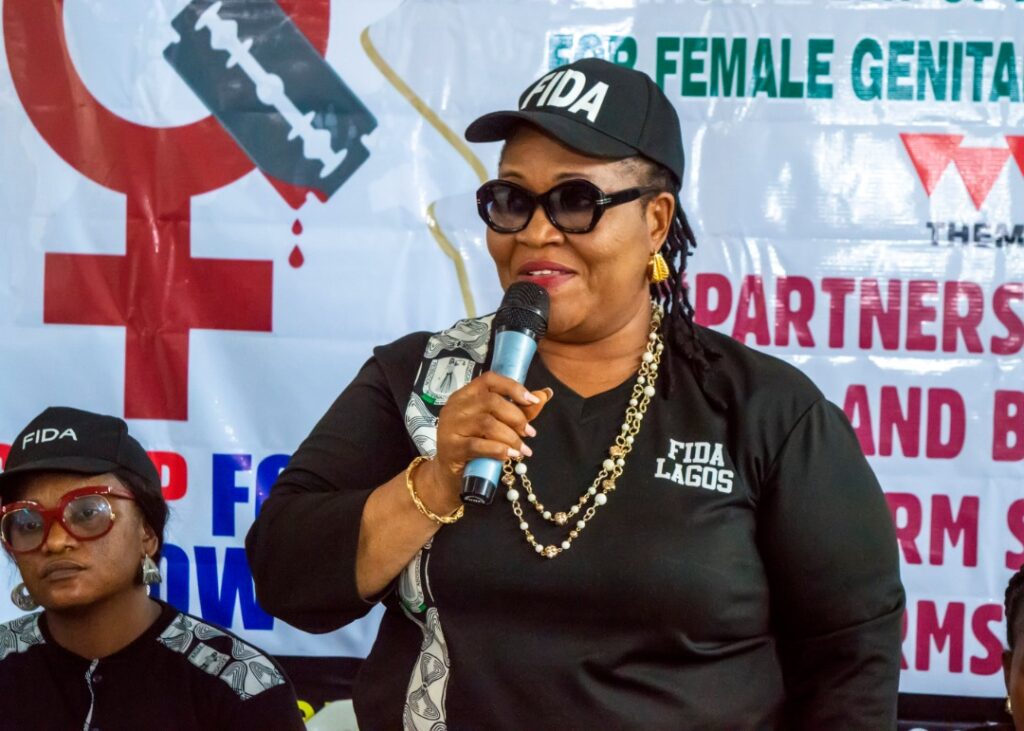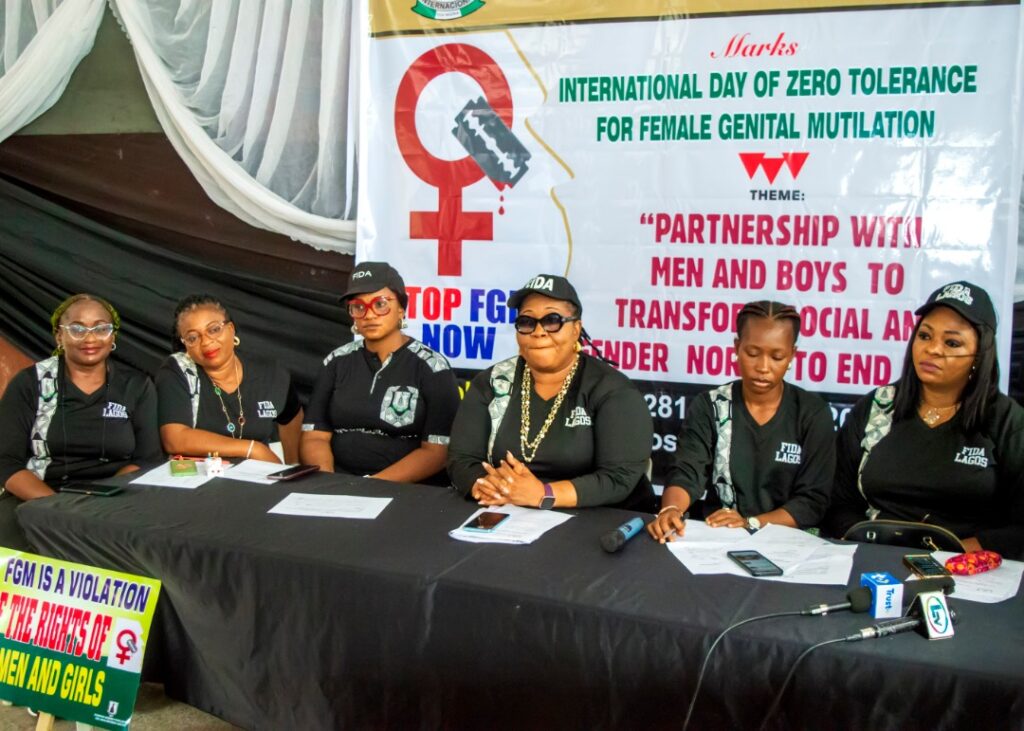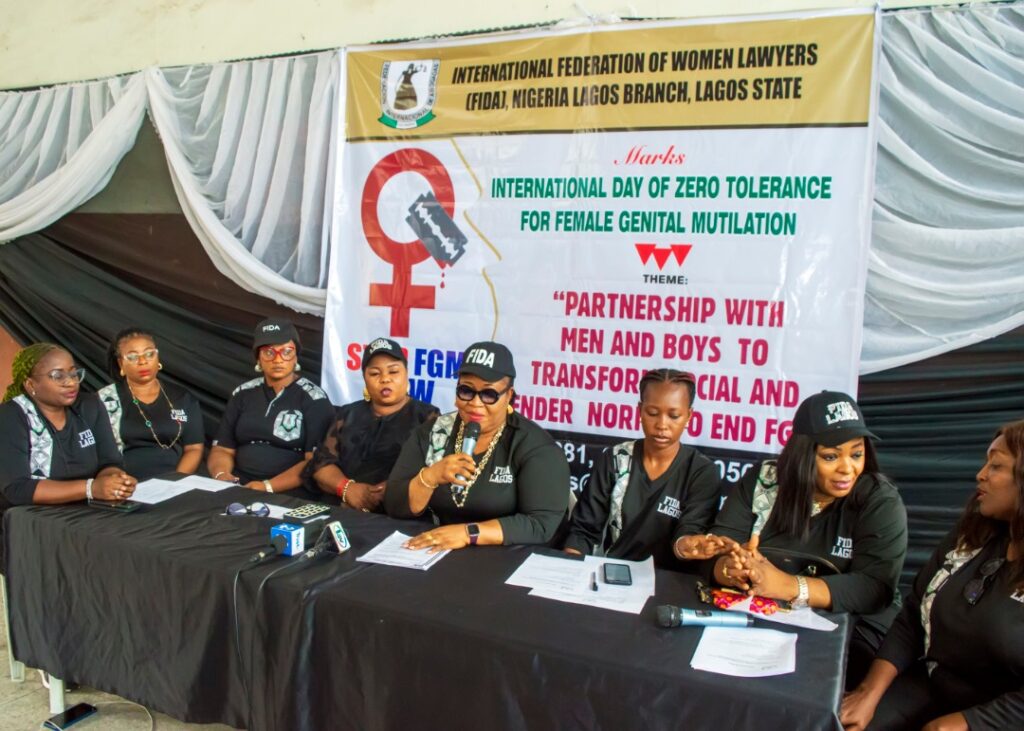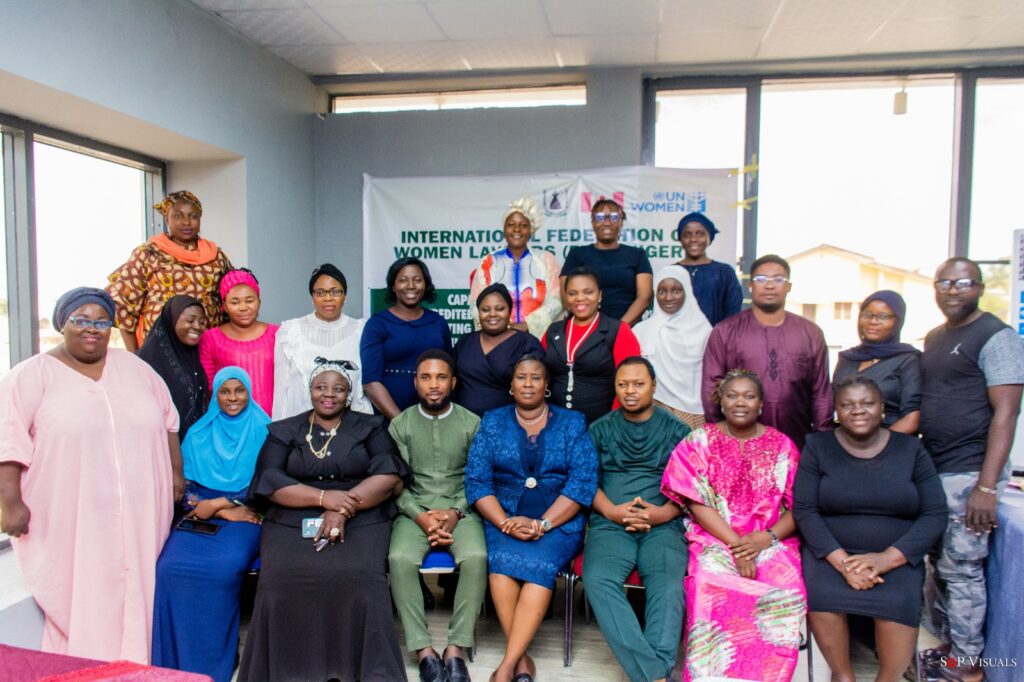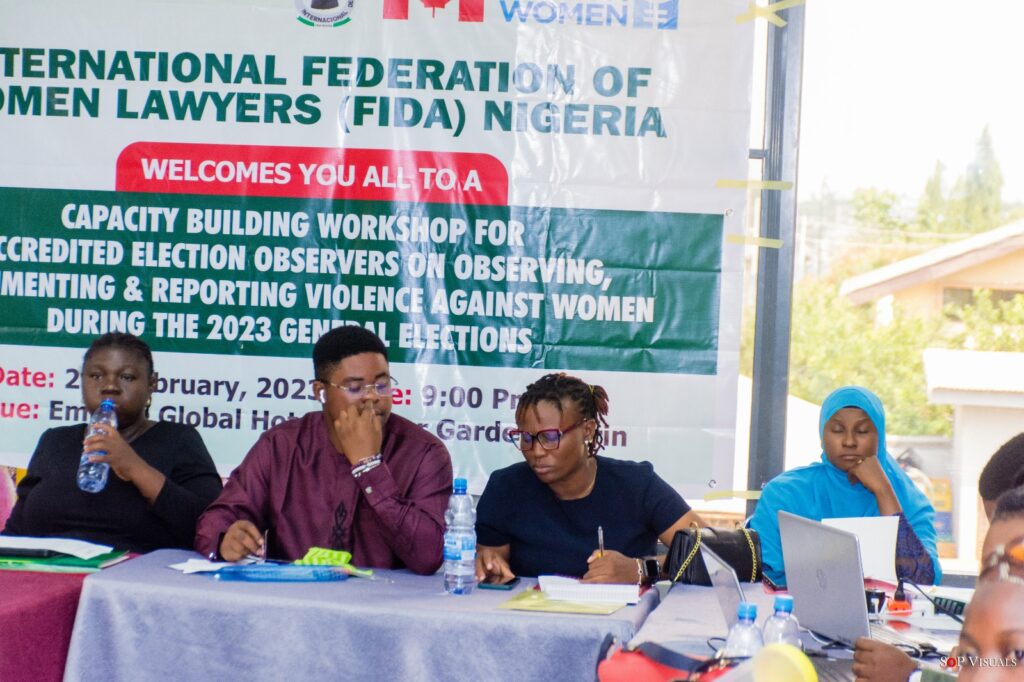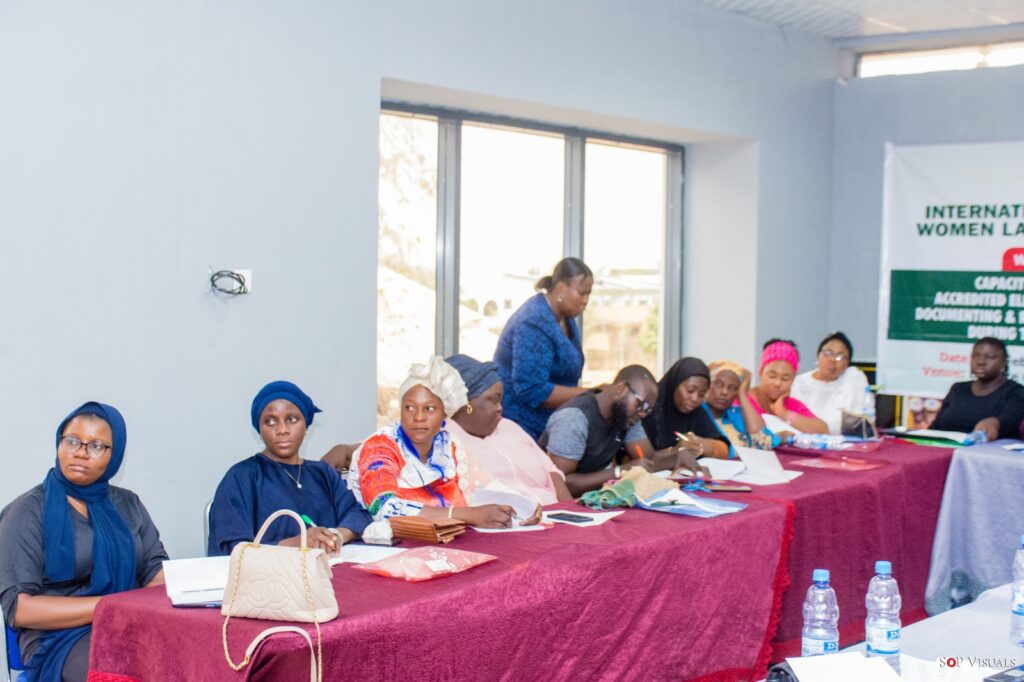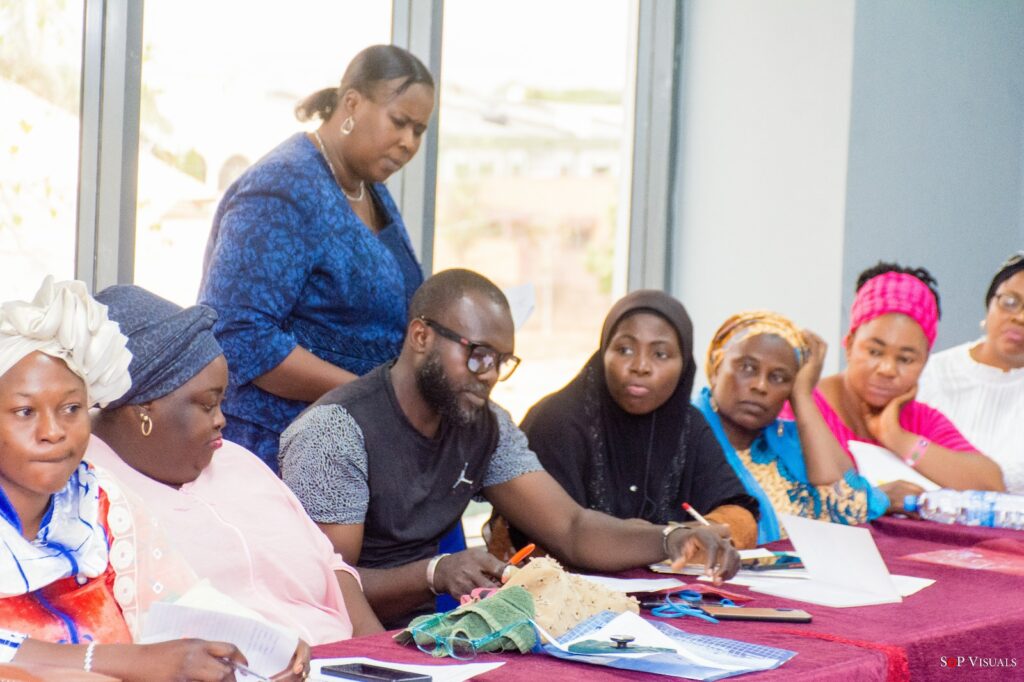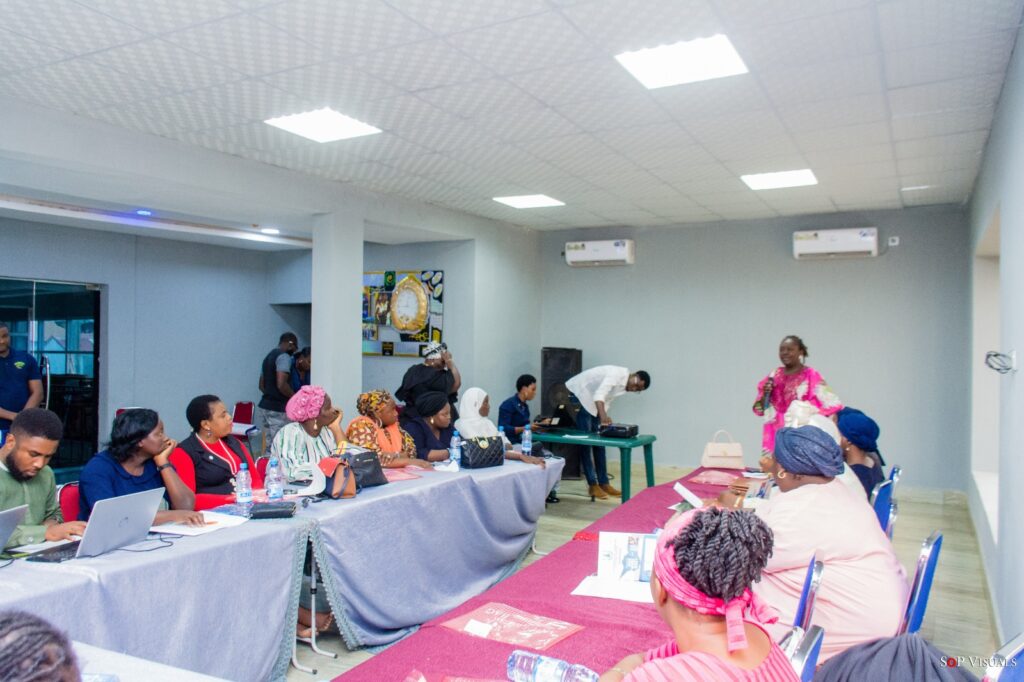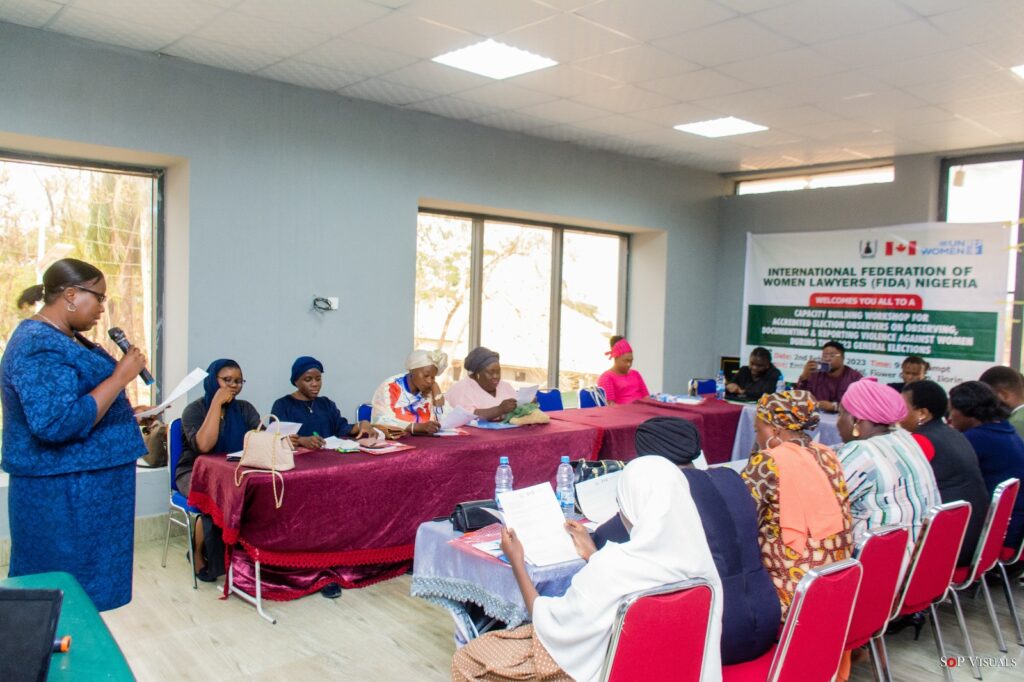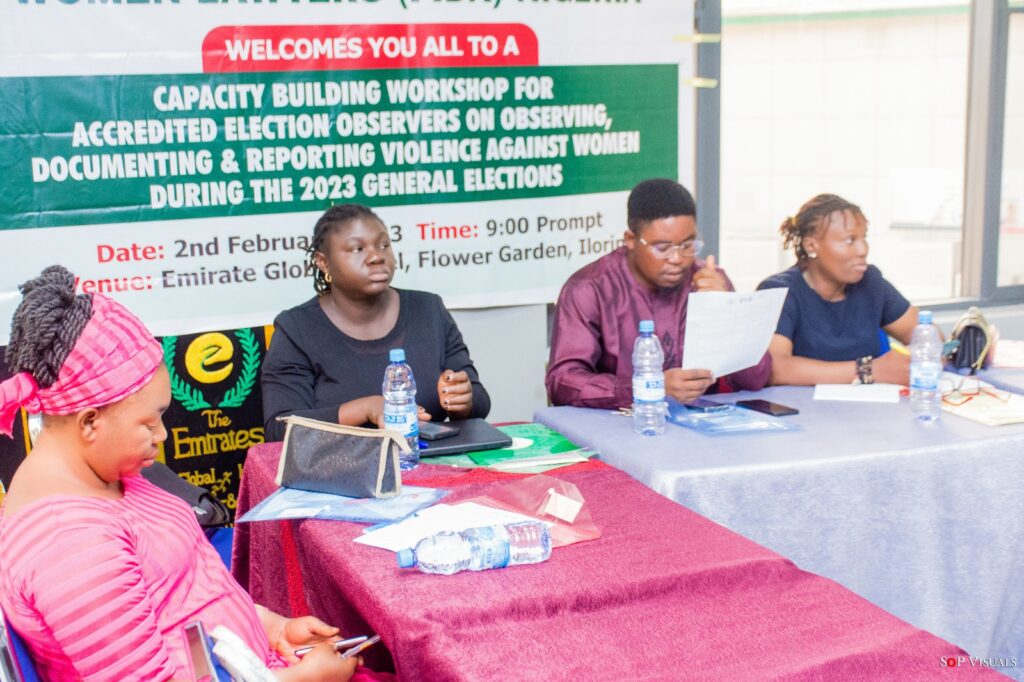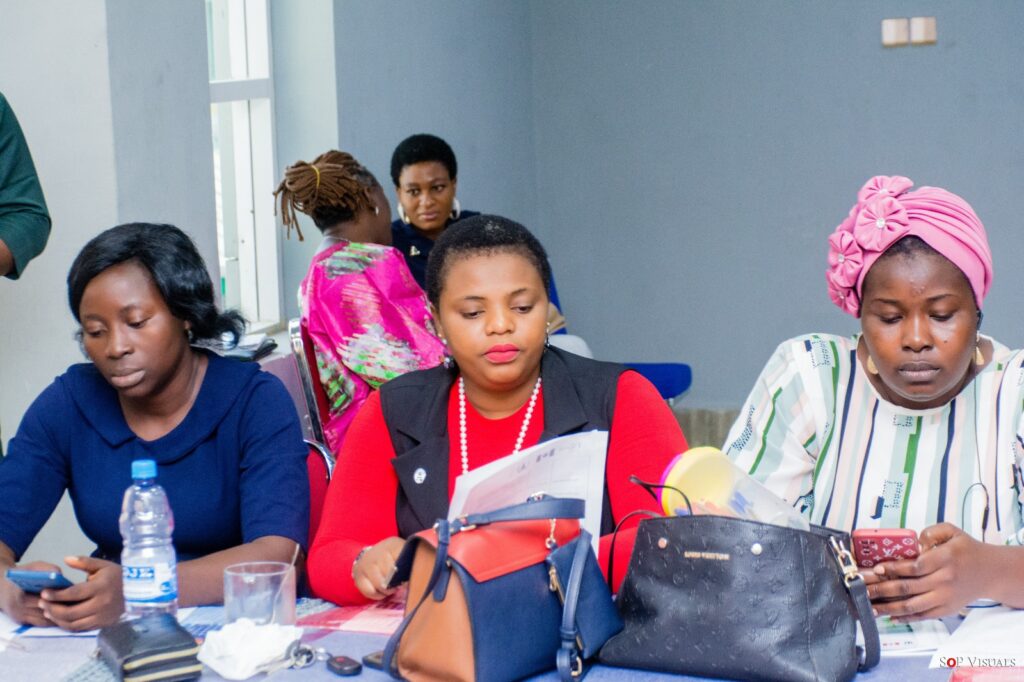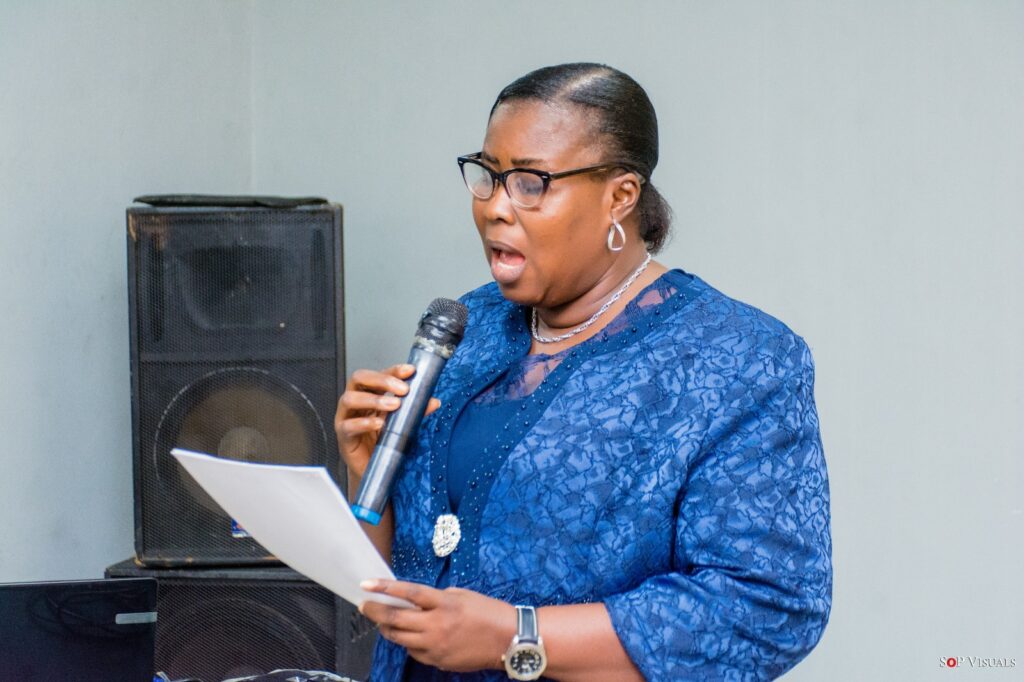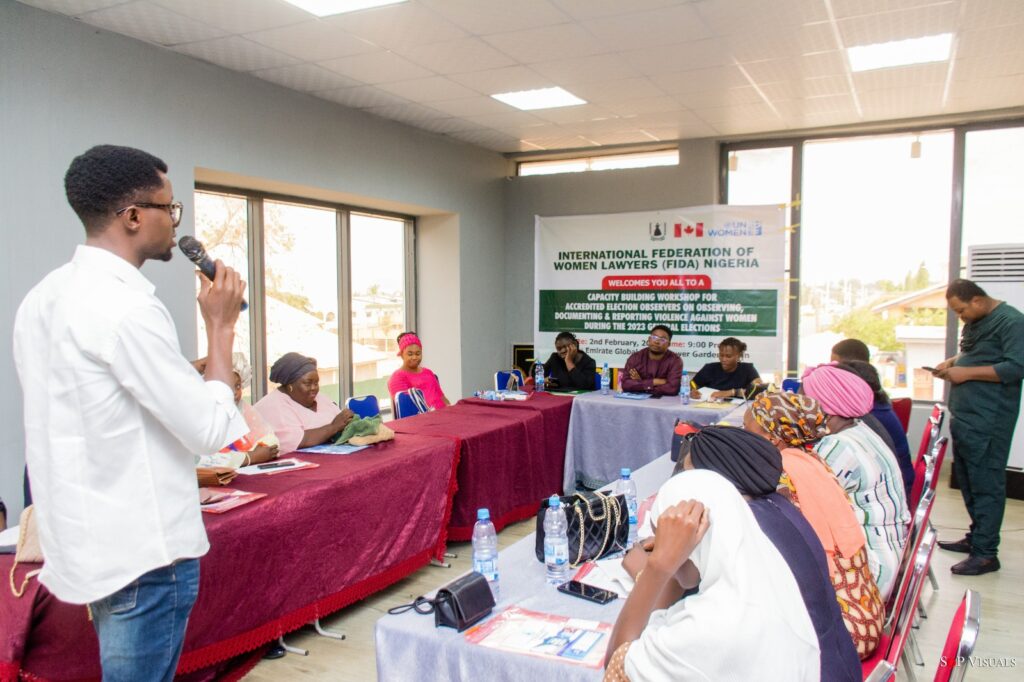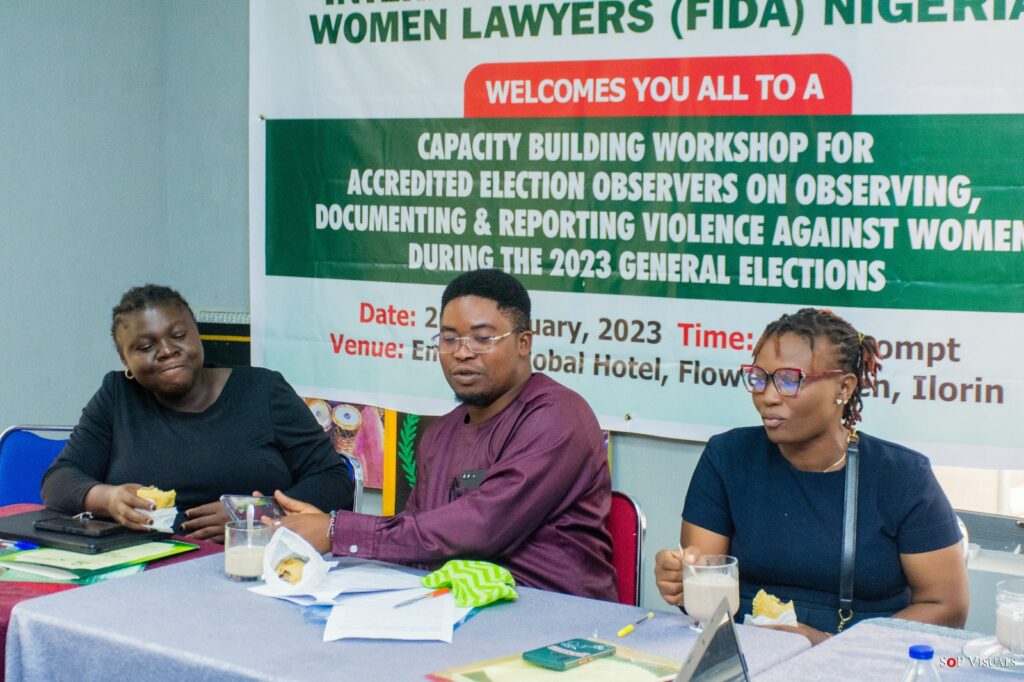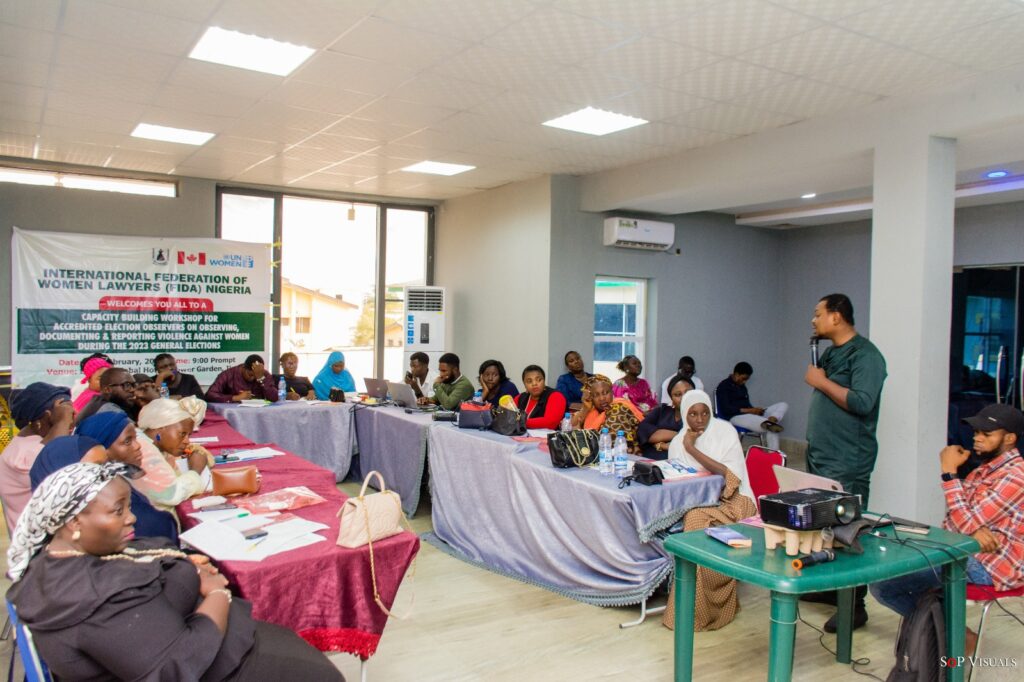
FIDA Nigeria preliminary statement on the presidential & national assembly elections as it relates to women participation
1.0 Introduction
FIDA Nigeria through her situation room situated at Nicon Luxury Hotel, Abuja, the Nigeria Capital respectively is observing the participation of women and forms of violence perpetrated against women across four focal states of our intervention mainly Borno, Plateau, Kaduna, and Kwara states
2.0 Methodology
FIDA Nigeria with support from UNWomen and the Government of Canada under Advance Women Political Participation Project is observing the participation of women and forms of violence perpetrated against women in the 2023 General Elections through 77 INEC accredited observers deployed across 66 polling units in the aforementioned four focal states.
An election monitoring tool was administered by our accredited observers at their respective polling units while leveraging partnerships with other civil society actors in observing, documenting, and reporting women participation and incidences of violence perpetrated against women. FIDA Nigeria continues to closely watch the process across the 66 Local Government Areas under our observatory process until it is concluded by the Independent National Electoral Commission (INEC).The following issues are highlighted as part of our preliminary report:
2.1. Commencement of Polls
Reports across the polling units across our focal states observed indicate that election materials arrived at polling units observed between the hours of 8:30 – 9:30 am. 38 % of the polling units had the election materials before 8.30 am, 19.7% by 9.30 am, and 42.3% later than 9:30 am.
2.2. Mainstreaming of Female Electoral Officials
Furthermore, we observed that 26.8% of polling units visited had three electoral officials, 69% had 4 electoral officials, and less than 4 % had two (2) electoral officials. With regards participation of female electoral officials, we observed about 47.9% had more than 2 female electoral officials, 39.4 % had less than 2 officials, while 12.7% had no female electoral officials.
2.3. Security Observations
We observed that 26.8% had more than 4 security personnel, 22.5% had 3 security personnel, 28.2% had 2 security personnel, while 22.5 % had either one or no security presence at the polling units. Females were observed not fully mainstreamed by relevant security agencies in the polling units visited. Statistics from the field indicate that no female security official was seen in 49.3%, 33.8% of the polling unit had less than two female security personnel, while only 16.9% had above 2 female security officials. Furthermore, security personnel were found armed at polling units in about 18.7% of the polling units observed, however, in 81.7%, security personnel were not armed.
In 88.7% of the polling units, women felt very secure in the polling units, while women in 9.9% of the polling units, experienced some level of insecurity.
2.4.Partiality of Electoral & Security Personnel
In 91.5% of our polling units, electoral and security personnel were observed to demonstrate some level of impartiality, however, there were some concerns of the level of partiality in about 8% of polling units visited
2.5. Turnout of Female Voters:
FIDA Nigeria observed a large turnout of female voters in about 66.2% of the polling units observed. in polling unit 006, ward 2, Kaiama LGA, Kwara State. In Unit 007, Ward 2, Mafa LGA, Borno State, Women were observed in good numbers exercising their franchise.
2.6.Under-Aged Female Voters
In 94.4% of the polling units visited, we observed no incidence of underage voting by Females. However, in 5.6% of polling units observed, underage voting was witnessed. For instance, in polling unit 003, Ward 1, Zaria LGA, young girls were observed clearly below the stipulated age voting. In polling unit oo6, Ijabo ward , Oyun LGA, Kwara State, a similar occurrence occurred.
2.7. Priority Voting for Women from Marginalized/Vulnerable groups
FIDA Nigeria observes that women with disabilities, the elderly/Aged, pregnant women and Nursing mothers were prioritized in the voting process by INEC Adhoc Officials. Our Observers reported that in about 85.9% of the polling units, priority voting occurred, however in 14.1% of the polling units, these groups were compelled to join existing queues toward exercising their franchise.
For instance, at Polling Unit 001, Magajin Gari, Jema” LGA, Kaduna State, Priority voting was not observed as elderly Women were not given special consideration. However, at Polling units 002 & 003, Ward 7 Igabi LGA, an aged woman was observed given priority. In Plateau at polling unit 001, kitago in Bassa LGA, elderly and pregnant women were observed provided a separate voting priority queue, similarly, in Polling unit 005, RCM Primary School, Qua’an Pan LGA, the elderly and pregnant women also have a separate voting priority queue. At polling unit 002, Ward 6 Langtang North, women with disabilities are given priority voting, While at Mafa LGA Polling Unit 007, Ward 2, Borno State older women, nursing mothers, and remaining women were prioritized
2.8.Existence of Separate Queues for Women
In 84.5% of the polling units visited, we observed that INEC ensured that separate queues were created for women to exercise their franchise. However such was not existent in 15.5% of the polling units visited as INEC made no provisions, and neither were any form of enforcement by security agencies. In polling unit 001, RCM primary school kabwir, Kanke LGA, Plateau State, separate queues were not prioritized.
2.9. Functionality of the Bimodal Voters Accreditation System:
FIDA Nigeria has observed that across most polling units within our purview, the bimodal voter’s accreditation system was largely functional which aided accreditation and the voting process. In 91.5% of polling units visited, the BVAS Machine was highly functional, however in 8.5% of the polling units observed experienced technical difficulty which limited women participation,
2.9.1. Vote Trading: FIDA Nigeria observed a few disturbing incidents of vote trading across 1.6% of the polling units. However, 98.6% witnessed no incidences of vote trading in the polling units observed especially as our observers reported that these polling units were to have witnessed voting inducements. We will update the media as we receive further information from our deployed observers
3.0.. Conclusion
FIDA Nigeria will continue to observe the elections and later issue her post-election statement to detail more on the overall participation of women and perpetrated violence.
God bless the Federal Republic of Nigeria.
Amina Agbaje (Mrs)
Country Vice President/National President
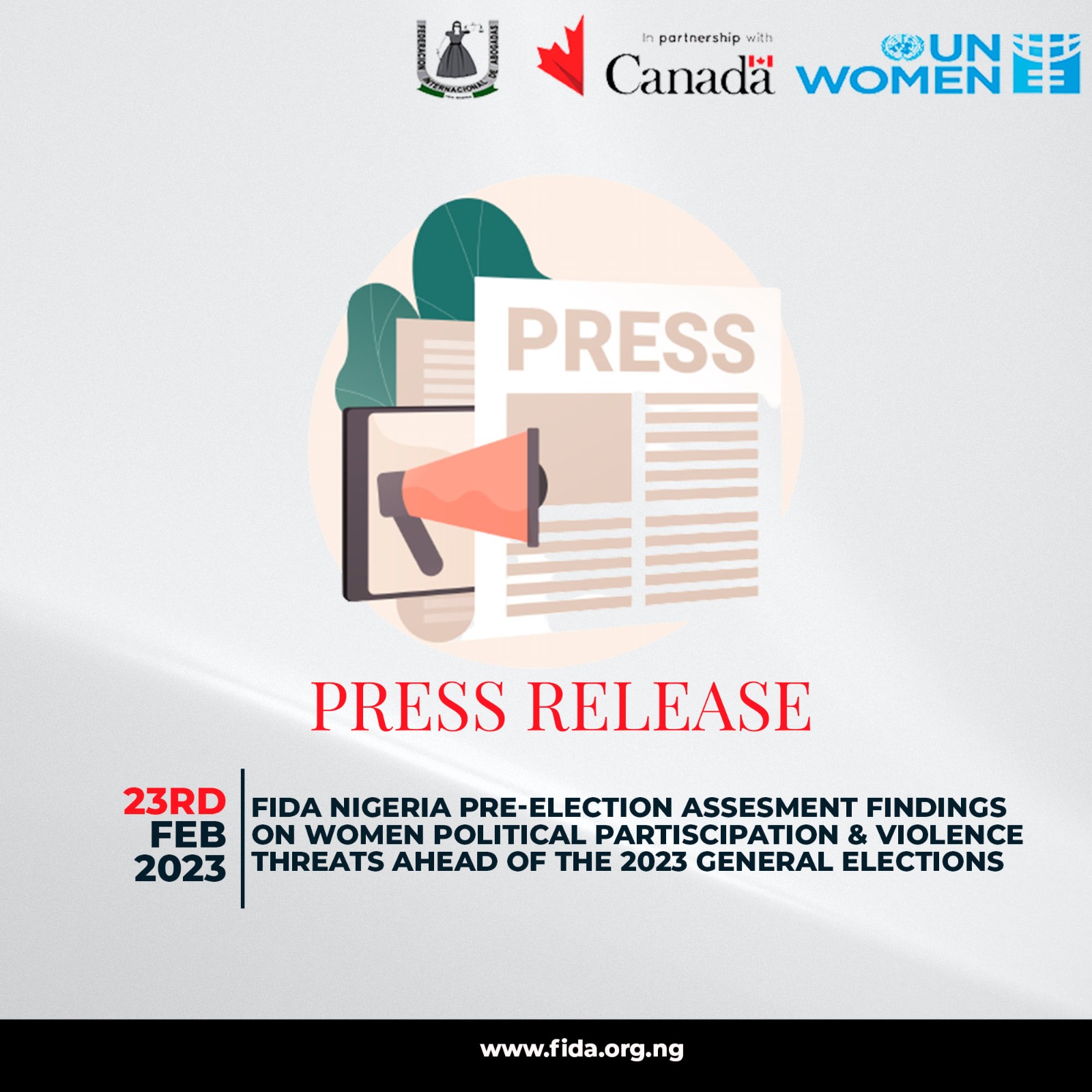
FIDA Nigeria pre-election assessment findings on women political participation & violence threats ahead of the 2023 general elections
1.0. Introduction
On Saturday 25th February 2023, Nigerians will exercise their franchise across 176,606 polling units across the country towards electing suitable candidates for Presidential and National Assembly seats. This election marks the third major election conducted following the enactment of the Electoral Act 2022 after the Ekiti and Osun states off-cycle Governorship Elections with attention hinged on the Independent National Electoral Commission (Electoral Management Body) performance in administering the polls.
The International Federation of Women Lawyers (FIDA Nigeria) has diligently observed situational happenings and pre-election incidents ahead of the general elections. We have observed an upsurge in the total number of registered voters with an increase from 84,004.084 million at the last general elections in 2019 to about 96.2 million presently. This indicates that more citizens are engaging in the political process and have taken advantage of the continuous voter’s registration towards ensuring that their votes count at the polls.
Interestingly, from the total number of registered voters pegged at 96.2 million, Nigeria women/female voters account for about 47.51% of the total number of votes. There has been an increase in the number of female voters from 39,598,645 to 44,414,846 and from 47.14% in 2019 to 47.51% in 2023.
Statistics from the Independent National Electoral Commission indicate that about 15,303 candidates representing registered political parties are contesting available seats in the General Elections namely Presidential, National Assembly, Gubernatorial and States Houses of Assembly nationwide. However, only about 1,557 females constituting about 10.17% are contesting as candidates which is below 13% representation totaling 3,163 in 2019. This has clearly reiterated the fact that Nigeria’s democratic experience has not expanded opportunities for meaningful participation and representation of women in politics and governance and a reduction in participatory elective positions for females.
Our Pre-election findings have indicated that Violence and insecurity, among other factors, contribute to the low level of women’s participation in politics and decision-making in Nigeria.
FIDA Nigeria with support from the UNWomen and the Government of Canada has assessed the security environment of the 2023 General elections most especially across four focal states of our intervention mainly Borno, Plateau, Kaduna, and Kwara states, emphasizing election risk factors that could negatively impact election security, cause electoral violence, and limit women’s participation.
2.0. Methodology/ Approach
FIDA Nigeria with support from UNWomen and the Government of Canada under the Advance Women Political Participation Project will observe the participation of women and forms of violence perpetrated against women in the 2023 General Elections through 80 mapped and selected observers who are being accredited by the Independent National Electoral Commission to identify, observe, document and report incidences of violence against women pre, during and post elections. These trained citizen observers have been deployed across 66 Local Government Areas in the aforementioned focal states.
We developed violence against women in elections perception survey tool which was administered in November 2022, through face-to-face interviews. Enumerators conducted the interviews mainly in the English Language but sparingly complemented with the local Language to facilitate comprehension for the rural residents. Using a stratified random sampling technique, geographic quotas were assigned to ensure the selection of a representative sample proportionately covering most local government areas (LGAs) in the focal states.
Consequently, with the aid of a geographic information system, FIDA Nigeria monitored in real-time the movement and location of Enumerators on the field. In addition, a common WhatsApp group was created to serve as a real-time clearinghouse for raising and addressing concerns or challenges encountered in the field. In view of the foregoing, FIDA Nigeria is confident of the validity of the data generated and utilized for the analysis. This perception largely corresponds to findings from other qualitative sources, including documented sources, the internet, and newspaper report amongst others.
Ahead of the 2023 General Elections, We had further developed an election monitoring tool that will be administered by our accredited observers. We will leverage on partnerships with other civil society actors in observing, documenting, and reporting women participation and incidences of violence perpetrated against women. FIDA Nigeria citizens’ engagement will be made possible through the establishment of a central situation room at Nicon Luxury Hotel, Abuja, the Nigeria Capital where our data analysts will be documenting and analyzing incidences and findings from our accredited observers.
A total of 1,558 respondents who were 18 years and above participated in the survey, The general public are respondents who may not have vast, technical knowledge of the subject matter. Specifically, this group includes artisans, civil servants, youths, and businesspeople, among others.
3.0. General Observations/Expectations
i. Low Representation of Female Candidates: Ahead of the Presidential & National Assembly Elections. We have observed that only few women emerged as candidates of political parties. For instance, out of 18 candidates contesting for the coveted seat, only one (1) is a female amounting to about 5.5% representation. Furthermore, from the 1,101 candidates contesting for 109 seats in the Nigeria Senate, only 92 from this number are females representing about 8.35%. Similarly, only 286 persons out of 3,111 candidates contesting for 360 seats in the Federal House of Representatives are females amounting to about 9.2% representation. Cumulatively only 1,557 females constituting about 10.17% are contesting as candidates for all positions in the 2023 General Election.
ii. Identification of 31 Local Government Areas as hotspots triggering violence against women ahead of the 2023 general elections: FIDA Nigeria through her quantitative surveys had identified key hotspots and areas that will militate against women participation in Borno, Plateau, Kaduna and Kwara states. These local Government Areas include: Ifelodun, Ilorin West, Irepodun, Isin, Kaiama, Moro, Offa , Oke ero (Kwara State). Bassa, Shendam, Riyom, Qua’an Pam, Jos East and Kanam (Plateau State). Zaria, Sanga, Sabon Gari, Lere, Kubau, Kajuru, Kaduna South, Jema”a, Ikara, Giwa, Igabi, (Kaduna State) and Marte, MMC, Damboa, Gubio, Damboa, Bama (Borno State). These identified hotspots have been penciled as high-priority areas and presented to the respective security and peace-building architectures towards effective deployment of personnel and materials towards improving women participation and forestalling violence perpetrated against women.
iii. High Expectations for Peaceful Elections towards increased women political participation: Across the four focal states, the expectations for a peaceful election towards enabling women participation is quite commendable. The overall outlook of a peaceful election in the state is quite impressive, with 69.3% of respondents affirming that position in Kaduna State. In Kwara state, 87% of respondents displayed high optimism for a peaceful election. Similarly in Plateau state, 76.4% affirmed this position. In Borno State, 71.8% shared the same optimism. Elections are expected to be peaceful in Kachia, Kaduna North, Chikun, Kagarko, Kaura, Kauru, & kudan Local Government Areas of Kaduna State. In Plateau state, high expectations exist in Barkin Ladi, Bokkos, Jos North, Jos South, Lantang North, Lantang South, Mangu, Mikang, and Pankishin LGAS. Similarly, Asa, Baruteen, Edu, Ekiti, Ilorin East, Ilorin South, Oyun, and Pategi have an average expectation for a peaceful election. Conclusively, Mafa, Magumeri, Bama & Jere are seen as LGAS with high optimism in Borno State
• Issues that can trigger Violence against Women in Elections: Our pre-election findings from respondents across the four focal states have averagely indicated that many factors could engender violence against women in the election. These include and are not limited to economic hardship(79.8%), discrimination against women (79%), kidnapping (80.4%), assassination (78.9%), ethnic, religious & communal clashes (83%), inadequate presence of security agencies (54.1%), media (62.9%), insurgency (83.8%), party thugs (94.2%) , hate speech (94.8%), issues affecting voters registration/non-collection of permanent voters card (88.7%), discrimination (90.7%), economic hardship (93.4%), court judgment (75%), vote buying (96.7%), lack of synergy between INEC & Security Agencies etc amongst others.
iv. Securing the polls: We expect strategic deployment of security personnel across the 176,606 polling units of the state towards forestalling any form of violence at the polls which will limit the participation of women in the general elections. The deployment of 310,973 police personnel by the Nigeria Police is a step in the right direction however the numbers fall short of the global best practice of a minimum of four security personnel stationed in every polling unit as we may have less than 2 persons per polling unit. We call on other sister agencies like the Nigeria Security and Civil Defence Corps, the Economic and Financial Crimes Commission, the Federal Road Safety Corps amongst others to massively deploy their personnel at the polls to checkmate all forms of violence perpetrated against women and checkmate vote-buying that may impede the credibility of the poll. We hope to find security personnel at the polling units identified by their name tags , demonstrate non-partisanship in the discharge of their responsibilities and abide with the revised code of conduct and rules of engagement for security personnel on electoral duty.
v. INEC logistical arrangements to aid priority voting for vulnerable female groups: We expect early deployment of sensitive and non-sensitive election materials at the polling units as well as election officials at the commencement of polls. This will help to promote confidence in the system and improve credibility of the poll. We have observed that the Independent National Electoral Commission has religiously followed her set timetable & schedule of activities sequel to the elections which are in consonance with the dictates of the Electoral Act. We hope that the Election Management Body abides by her 2018 framework on access and participation of persons with disabilities in the electoral process and the provisions of the Disability Act of 2019 towards ensuring effective and seamless participation of women with disabilities, nursing mothers, pregnant women, aged/elderly women and other vulnerable groups at the polls.
vi. High turnout of female voters: We expect that the increase in registered voters will translate to more voters especially women participation at the polls. We recall that at the 2019 general elections, only 28,614,190 voters representing about 35.66% of the total voting population exercised their franchise. We expect that due to increased voter’s awareness and continuous voter’s registration, which has witnessed an increased number of registered women voters to 44,414,846, more women will participate actively which will transcend to an increased voters turn-out at the polls.
vii. Functionality of the Bimodal Voters Accreditation System: We have observed the success of the mock accreditation system to test the functionality of the BVAS across 436 polling units nationwide and hope that the system is well configured towards aiding the accreditation and voting process at the polls. FIDA Nigeria through her field observers will critically observe the functionality of the BVAS across the polling units in the states of our observations
viii. Separate Queues for Women: Towards reducing barriers to women participation in these elections due to cultural and religious factors, we expect that INEC will create separate queues for male & female voters which will provide an enabling environment for favorable participation from female voters.
4.0. Recommendations
In light of the foregoing, key actors in the electoral processes particularly INEC, political parties, security agencies, mass media, and Civil Society Organisations need to pay increasing attention to the identified risk factors limiting women’s participation with a view to tackling them headlong. This demands short, medium, and long terms interventions that will address the roots of the highlighted contradictions in a sequential manner.
As such, the following recommendations are considered pertinent:
- There is a need for all stakeholders, particularly INEC, political parties, mass media and CSOs to put in place machinery to tackle all forms of violence perpetrated against women in elections.
- Deployment of Electoral materials (Sensitive & Non –Sensitive) across all Registration Area Centres and polling units timeously is key for an improved political participatory process for women
- Effective regulation of the mass media not just to ensure compliance with established rules and standards, but also ensure enforcement of penalties when such rules and standards are violated, especially with respect to equality of access for all parties and candidates to state-own media outlets, as well as the broadcasting and/or publishing of hate speech.
- Greater attention should be paid to the training, welfare and professionalism of security agencies in providing election security. Issues of logistics, timeliness and adequacy of deployment are of critical significance.
- Effective collaboration and synergy with other stakeholders especially INEC, political parties and CSO should be cultivated and sustained.
- Prompt responses to the early warning signs identified in this report should be seen as a priority by appropriate authorities.
5.0. Conclusion
These findings incorporated an assessment of the security environment of the 2023 General elections. It specifically explored the prospects or otherwise of peaceful election that can promote women’s participation, drawing insights from election risk factors that could negatively impact election security and trigger electoral violence against women in elections.
It is imperative that Stakeholders respond effectively to the issues raised in this report ahead of the General Elections across the Nation.
May God Bless the Federal Republic of Nigeria
Amina Agbaje (Mrs)
Country Vice President/National President
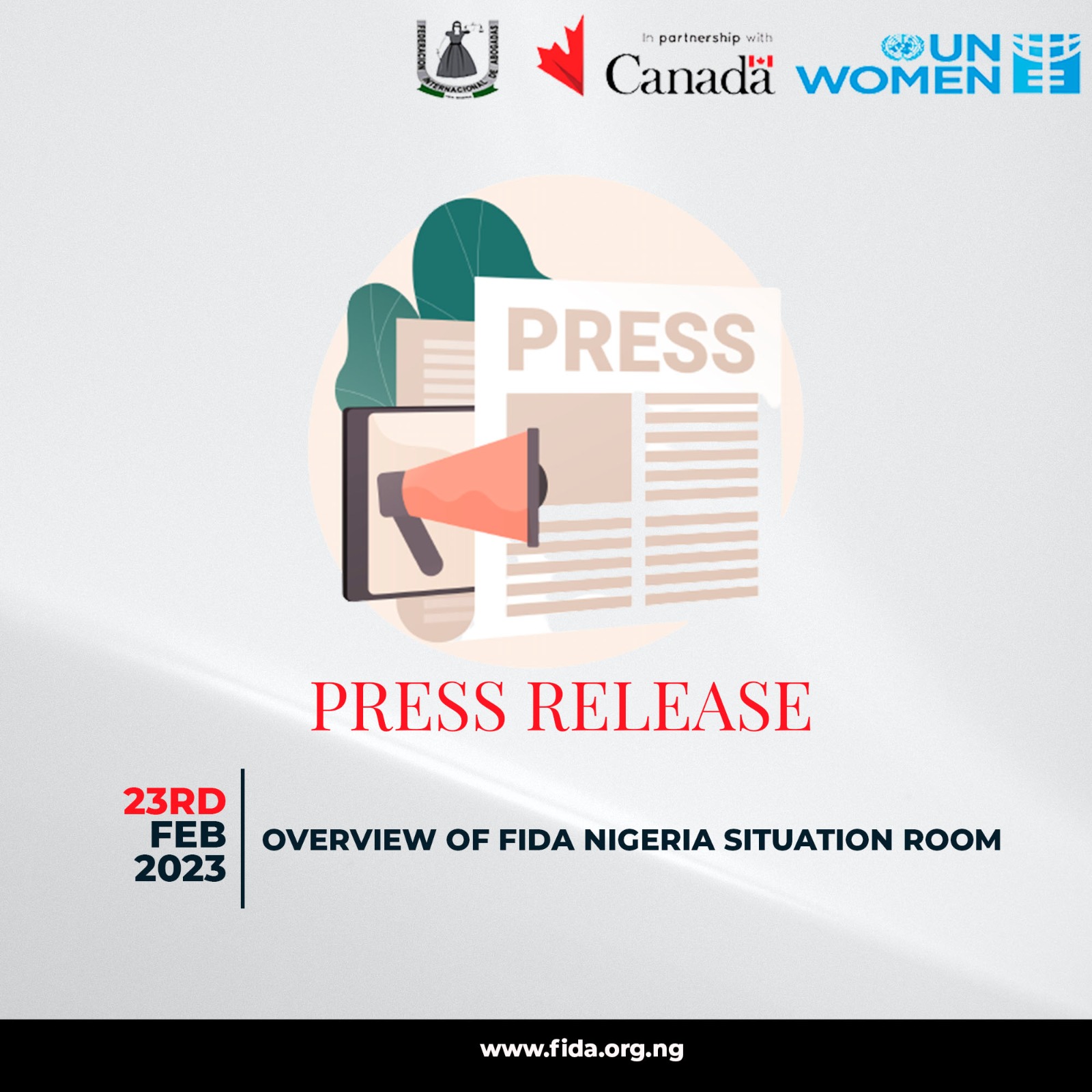
Overview of FIDA Nigeria Situation Room
The FIDA Nigeria situation room is being established to collate, document, report and escalate issues triggering and limiting women participation at the 2023 General Elections to appropriate authorities and relevant institutions through our selected & accredited observers in the four focal states of our intervention namely Borno, Kwara, Kaduna and Plateau states
The anticipated outcome will herald effective observation, and reportage of incidences of violence perpetrated against women in elections through synergy with law enforcement agencies, civil society organisations and other relevant stakeholders.
The situation room will be operational in two phases:
The Presidential /National Assembly Elections:
The situation room will be open on these days at Nicon Luxury Hotel with the following sub activities being implemented:
Thursday 23rd February 2023 (10am) – Launch/ Opening of the Situation Room (Nicon Luxury)
Dissemination & Release of our preliminary findings on pre-election environment as it affects women participation.
Friday 24th February 2023 (10am) – Briefing of Data Analyst and Incident Reporters
Briefing of Accredited Observers virtually
Attending to reports emanating from the Field observers
Saturday 25th February 2023 – (7.30 am) –
Collation & documentation of incidences pertaining Women participation and violence against women in Elections
Release of preliminary Election Statement on participation of women & violence incidents against Women at the 2023 Presidential/ National Assembly Elections in focal states.
Wednesday 1st March 2023 (10 am).
Release of Post-Election Statement on participation of women & violence incidents against Women at the Presidential/ National Assembly Elections in focal states.
Friday 10th March 2023 (10am):
Learning Dissemination Event on the Presidential & National Assembly Elections as it pertains women participation
Saturday 11th March 2023 (7.30 am):
Collation & documentation of incidences pertaining Women participation and violence against women in Elections.
Release of preliminary Election Statement on participation of women & violence incidents against Women at the 2023 Presidential/ National Assembly Elections in focal states.
Tuesday 14th March 2023 (10 am)
Release of Post-Election Statement on the participation of women & violence incidents against Women at the Governorship/State House of Assembly Elections in focal states.
Hotlines For Election Reporting
Towards mitigating all forms of violence perpetrated against women, FIDA Nigeria working in synergy with Law Enforcement agencies to ensure a safe and secure environment for women to fully participate in the polls and exercise their franchise has released a list of hotlines across focal states. Through these Hotlines, Members of the public can report any suspicious act or acts of violence perpetrated against women by unscrupulous persons or groups of persons capable of disrupting the peaceful conduct of the 2023 general election at their various polling units.
FIDA Nigeria will upon receipt of these reports escalate such reported incidences to the appropriate authorities to provide speedy response thus ensuring perpetrators are investigated, arrested and meant to face the full ambit of the law.
The public can contact us through the following hotlines:
FIDA Nigeria Situation Room (Abuja) – +2347088496115
FIDA Plateau-+2349025156545, +2348036016029
FIDA Borno – +2348039479561
FIDA Kaduna – +2349045843002, +2348053465759
FIDA Kwara -+2348033603532
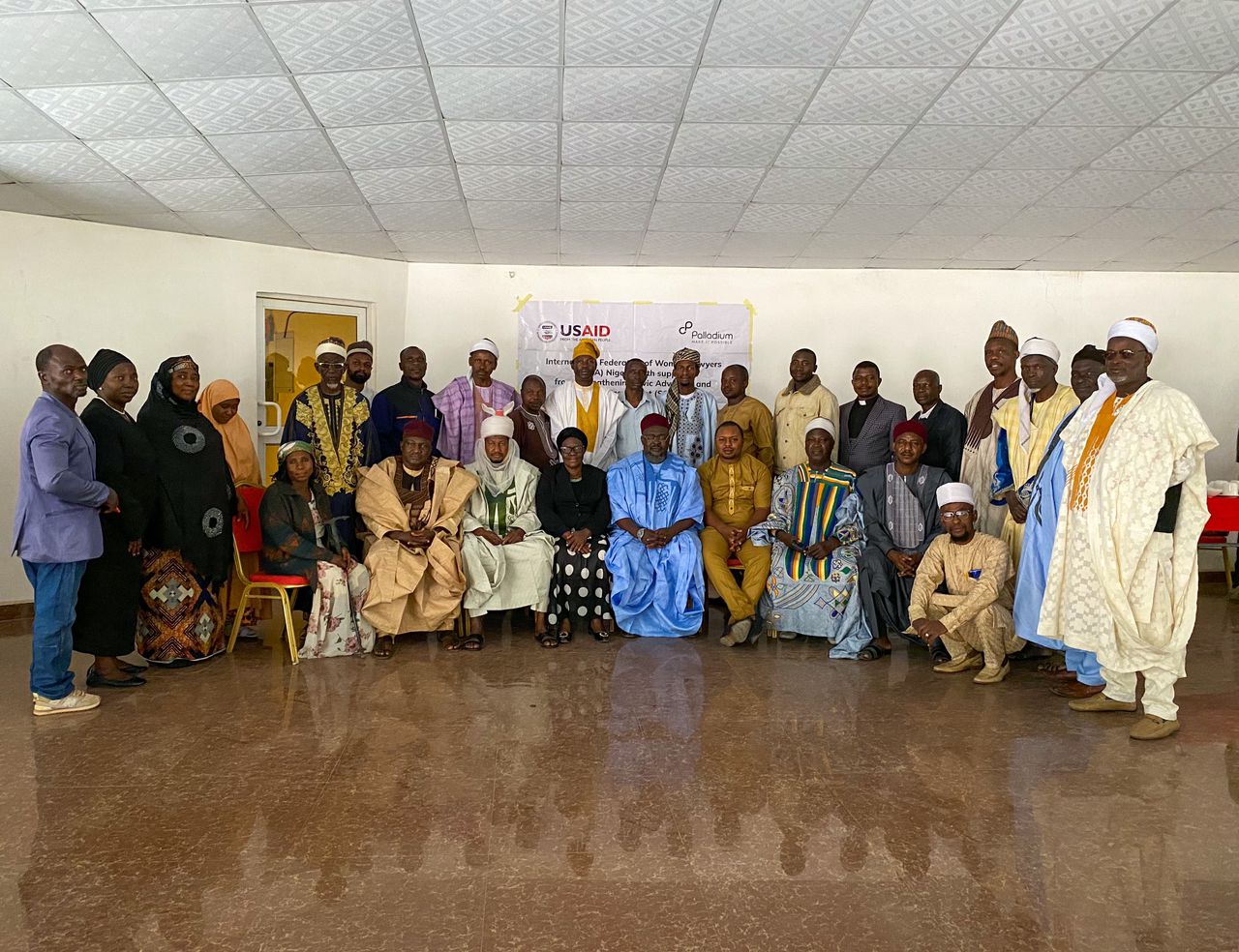
FIDA Nigeria holds a three-day capacity-building workshop for Traditional and Faith Leaders from Northern Nigeria
FIDA Nigeria on the 16th of February 2023, organized a three-day capacity-building workshop for Traditional and Faith Leaders from Northern Nigeria. 25 of these leaders are drawn across three Northern states namely Plateau, Bauchi and Katsina.
The objective of this workshop is to improve preventive and response measures on SGBV& CEFM by these selected leaders having knowledge of local realities that promote this menace. This activity commenced on Thursday 16th and will be concluded on Saturday 18th February 2023 in Jos, Plateau State, Nigeria.
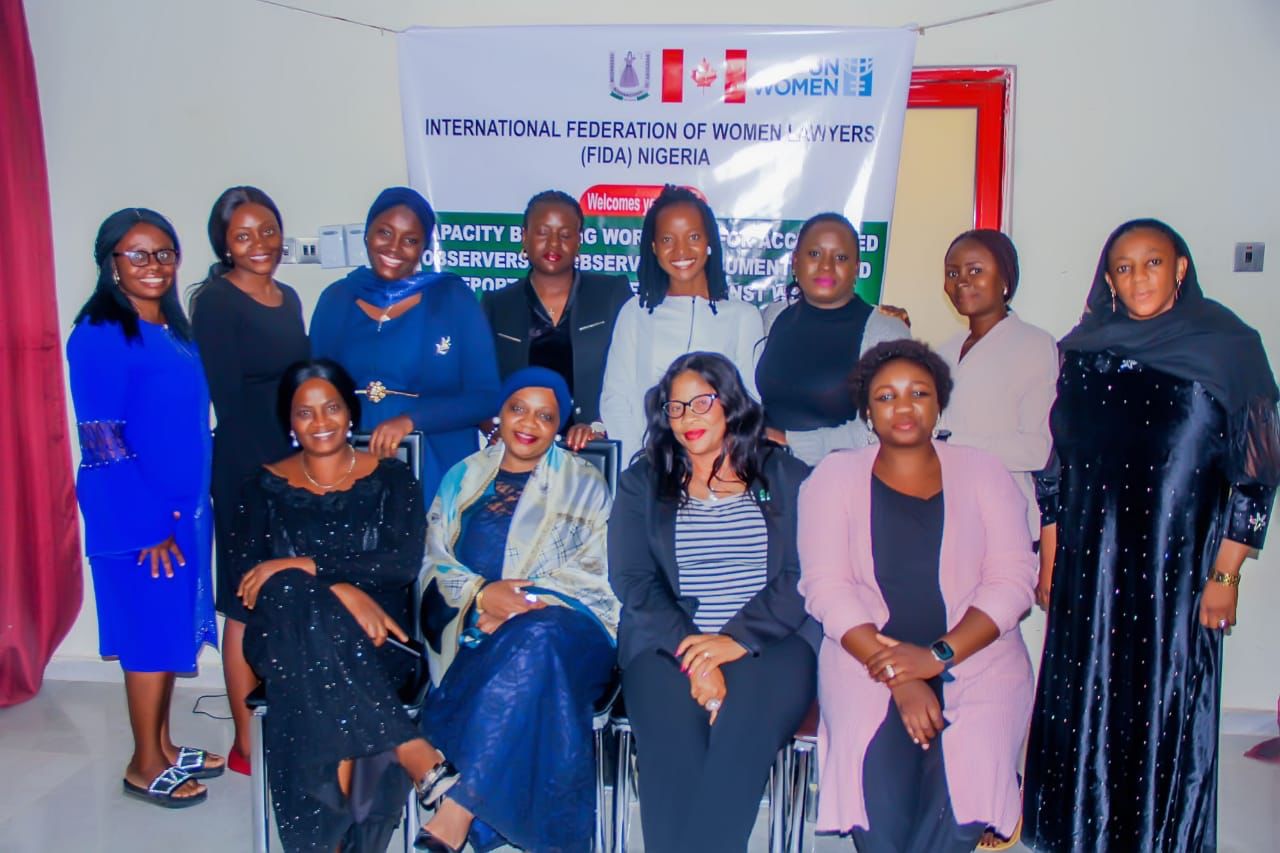
FIDA trains election observers on documenting violence against women in Kaduna State
On the 13th of February 2023, FIDA Nigeria organized a one-day training workshop in Kaduna State to strengthen the capacity of accredited observers drawn across the 23 LGAs in the state on observing, documenting and reporting women’s participation and incidences of electoral violence perpetrated against women before and during the 2023 General Elections.
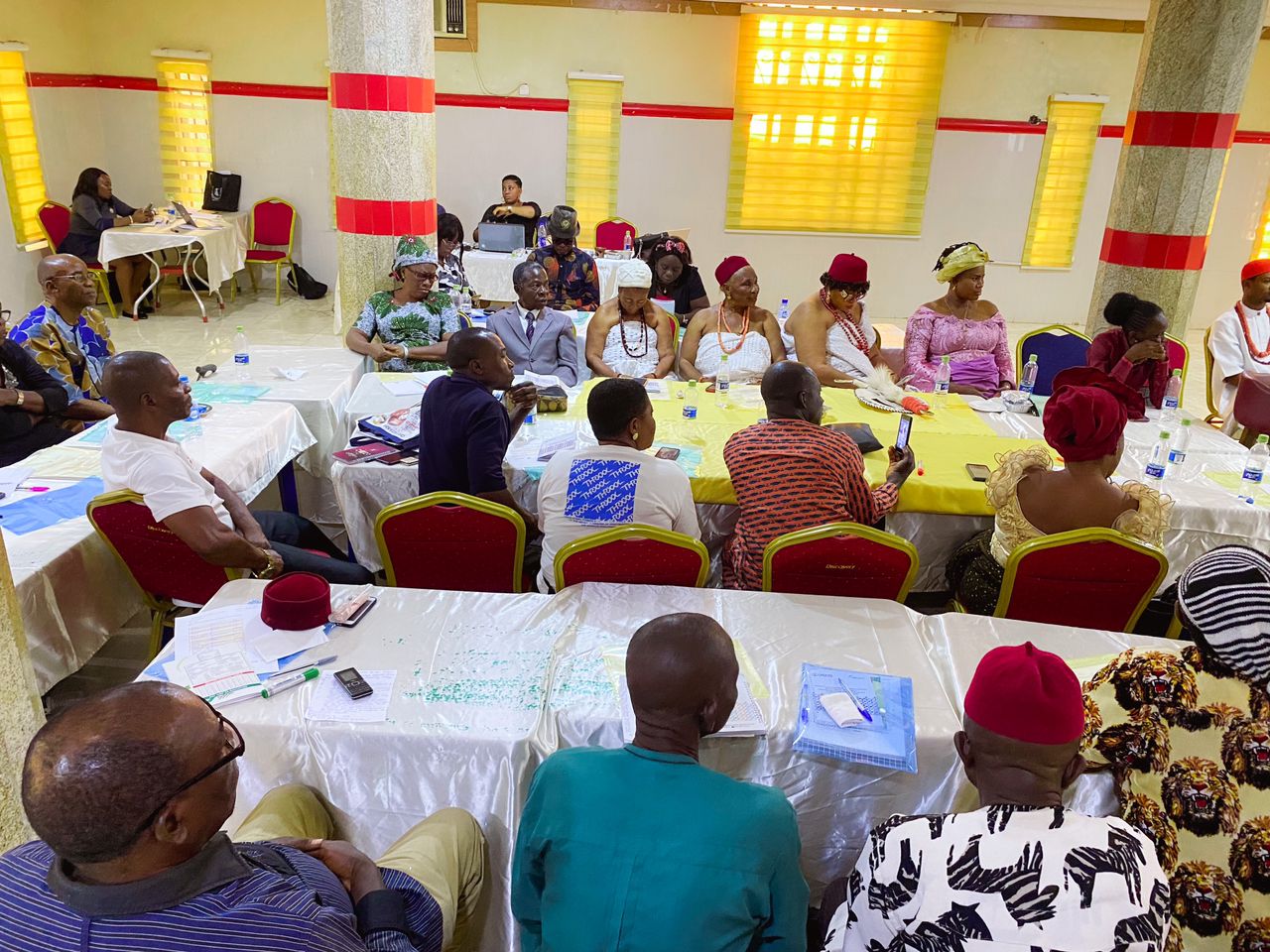
FIDA Nigeria Holds a capacity-Building workshop on increasing gender-sensitive information and awareness-raising on the menace of SGBV & CEFM for Traditional & Faith Leaders across Southern Nigeria
FIDA Nigeria is currently Organizing a Three-Day Capacity Building Workshop for 25 Traditional and Faith Leaders drawn from 16 Communities across three focal states in Southern Nigeria namely Delta, Edo and Ebonyi.
The activity commenced on Thursday 9th February 2023 and will culminate on Saturday 11th February 2023 in Asaba, Delta State.
The workshop aims at increasing gender-sensitive information and awareness-raising on the menace of Sexual and Gender-based Violence (SGBV) and Child Early and Forced Marriage (CEFM) through strengthening traditional and faith based Leaders on the prevention and response strategies in local communities where these issues are prevalent through this training.
These Community and Faith-based Leaders will be able to institutionalize and establish coordinated response and referral pathways in tandem with Law Enforcement agencies towards arrests and prosecution of perpetrators of these crimes while working with state actors to create a gender-sensitive and protective environment for survivors.
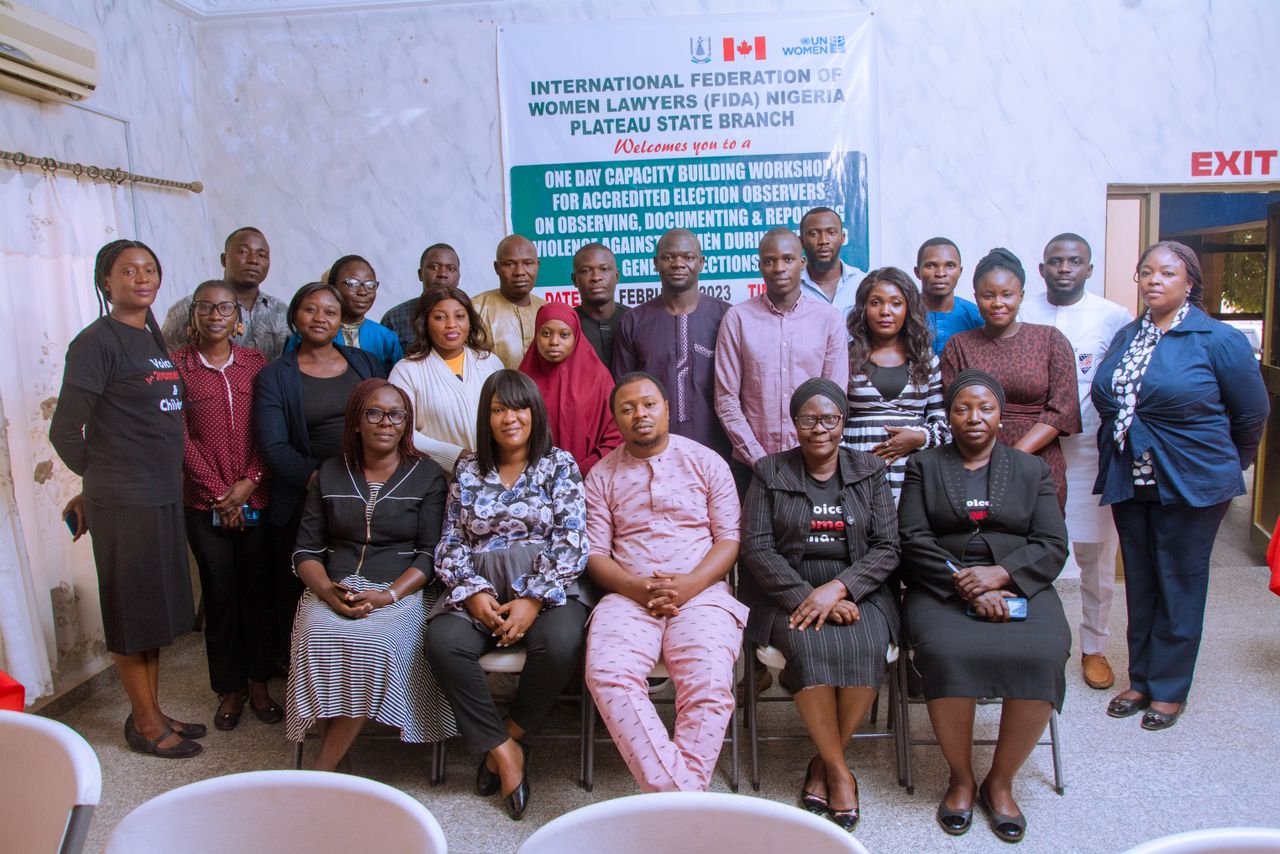
FIDA trains election observers on documenting violence against women in Plateau State
With barely two weeks to the nation’s general elections, the International Federation of Women Lawyers (FIDA) Nigeria, has identified violence as a major cause hindering the effective participation of women in politics.
It also decried the steady decline in women’s participation in politics, especially at the parliamentary level.
Country Vice President/National President FIDA, Mrs. Amina Agbaje said this at the capacity building workshop for accredited election observers, on documenting and reporting violence against women during the 2023 general elections, held in Jos, the Plateau State Capital.
Agbaje said, “Women constitute a powerful electorate with millions of votes in Nigeria.
“According to the Independent National Electoral Commission (INEC), Nigerian women signaled their intention to make their voices heard in the 2019 elections, accounting for about 47.14 percent (39, 598, 645 million) of the 84, 004, 084 million registered voters nationwide.
“Going into the 2023 general elections, there has been an interest in the number of female voters from 39, 598, 645 to 44, 414, 846 and from 47.14% in 2019 to 47.51% in 2023.
“Women represent about 50% of the Nigerian population; in spite of this, their level of participation and representation is increasingly very poor”, She lamented.
“Current statistics of women in parliament in Nigeria confirm that women’s representation in parliament is on a steady decline.
“9% in 2007, 7% in 2011, 5% in 2015, and less than 10% in the 9th National Assembly”, the FIDA President decried.
“Using the 2015 figures, there are only 4 women deputy governors in all of Nigeria’s 36 States”, She maintained.
“While factors militating against women’s participation are varied, a major cause hindering effective participation of women in politics is the issue of violence”, she explained.
Agbaje maintained that eradication of political violence was key in advancing women’s political participation stressing the importance of condensing political violence before and after polls to allow women participate fully.
“It is on this premise that this capacity building workshop is being organised towards advancing the participation of women in the 2023 general elections by strengthening our selected observers who are being accredited by INEC to identify, observe, document and report incidences of violence against women in the elections.
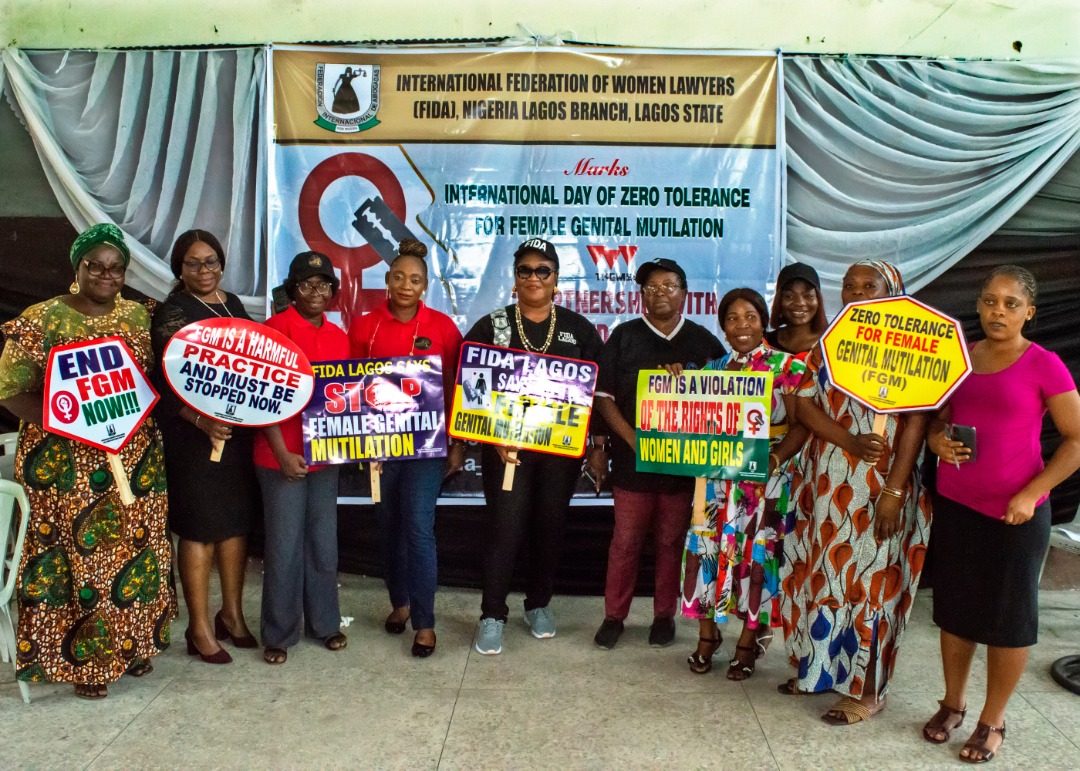
Female genital mutilation, an evil act – FIDA
By Abiodun Azi
The International Federation of Women Lawyers (FIDA) Nigeria, Lagos Branch, has condemned Female Genital Mutilation (FGM), describing it as an evil act.
Mrs. Chinwe Efobi, Chairperson, FIDA, made the assertion on Thursday in Lagos at an event to mark the International Day of Zero Tolerance for FGM.
The News Agency of Nigeria (NAN) reports that the International Day of Zero Tolerance for FGM is observed on Feb. 6 every year.
According to Efobi, the day provides an opportunity for all stakeholders involved in ending FGM to celebrate achievements, advocate for abandonment of the practice and raise awareness.
She said it was in this vein that FIDA Lagos joins the world to commemorate the Day which had the 2023 theme as: “Partnership with Men and Boys to Transform Social and Gender Norms to End FGM”.
She explained that FGM referred to all procedures involving partial or total removal of the female external genitalia or other injury to the female genital organs for non-medical reasons.
She said it was most often carried out on young girls between infancy and age 15, and usually referred to as circumcision.
“From statistics available, globally, more than 200 million women and girls have been mutilated.
“In Nigeria alone, more than 20 million women and girls have been mutilated and this figure represents 10 percent of the global total.
“What this figure means in essence is that one out of every 10 mutilated girls or women in the world is a Nigerian,” she said.
Efobi said that there were so many reasons why FGM was practiced in Nigeria, some of which are culturally inclined, patriarchal system or religious/cultural obligation.
She said it was sad to note that a number of countries still engage in the practice of FGM in spite the fact that some of the perpetrators are aware of the adverse effects on the lives of the victims.
She said that FGM affects young girls more than older women and the psychological effects could impact the lives of a young girl throughout her life.
She said, “FIDA Nigeria, Lagos branch, calls on all stakeholders to raise more awareness in the fight against FGM, and we must not relent in our efforts to raise our voices.
“We must take this campaign to families and communities still practicing this evil act.
“We also call on all government agencies saddled with enforcement responsibilities to take the issue of FGM more seriously.
“To curb the spread of this practice, more perpetrators need to be prosecuted and punished speedily to help achieve a sane and safe environment for women and girls to live in a society free of FGM,” she said.
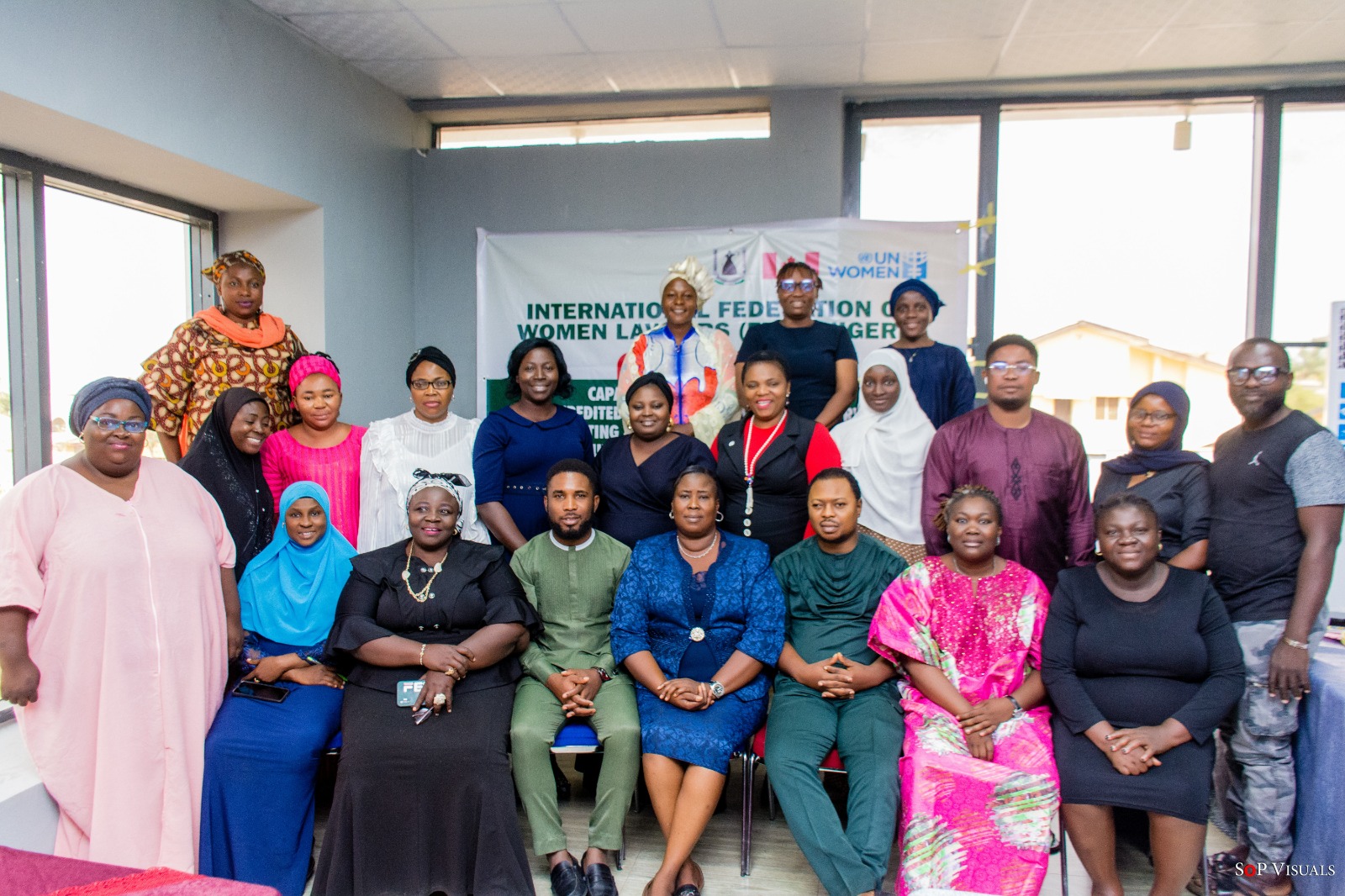
2023 Election: FIDA Nigeria holds workshop on reporting violence against women
As the 2023 general elections draw nearer, the International Federation of Women Lawyers (FIDA) on the 2nd of February 2023, held a workshop to train observers on reporting acts of violence against women during elections in Nigeria.
In her address at the program, the FIDA Nigeria Country Vice President/National President, Mrs. Amina Agabaje, which was delivered by the Ilorin branch FIDA chairperson, Barrister Gloria Okoduwa stressed that the one-day workshop is meant for accredited observers on observing, documenting and reporting incidences of electoral violence perpetrated against women before and during the 2023 General Elections.
She revealed that a similar workshop was being implemented across the four focal states of the intervention namely Kwara (North Central), Borno (North East), Plateau (North Central) and Kaduna (North West).In her words,
“Women constitute a powerful electorate with millions of votes in Nigeria. According to the Independent National Electoral Commission (INEC), Nigerian women signaled their intention to make their voices heard in the 2019 election, accounting for about 47.14 percent (39,598,645 million) of the 84.004.084 million registered voters nationwide.
“Going into the 2023 general elections, there has been an increase in the number of female voters from 39.598,645 to 44.414.846 and from 47,14% in 2019 to 47.51% in 2023 evidently women represent about 50% of the Nigerian population.
“In spite of this, their level of political participation and representation is increasingly very poor.
“Current statistics of women in parliament in Nigeria confirm that women representation in parliament is on a steady decline. 9% in 2007, 7% in 201-1, 5% in 2015 and less than 10% in the 9th National Assembly. Using the 2015 figures, there are only 4 women deputy governors in all of Nigeria’s 36 states. While factors militating against women participation are varied, a major cause hindering effective participation of women in politics is the issue of violence.
“She noted that the eradication of political violence is key in advancing women political participation as it is of paramount importance to condense political violence before and after elections so that women can fully participate in elections.
“The International Institute for Democracy and Electoral Assistance (IDEA) in laying credence to this fact have clearly recognized that, elections have triggered outbreaks of violence in which women and girls were victimized which have made women a tool of political harassment and violence before during and after elections.
“This has made female voters continue to be disproportionately affected by various forms of election-related violence or threats of violence which is the effect of keeping them away from the polling stations more than male voters.
“It is on this premise that this capacity building workshop is being organized towards advancing the participation of women in the 2023 general elections,” she said.


